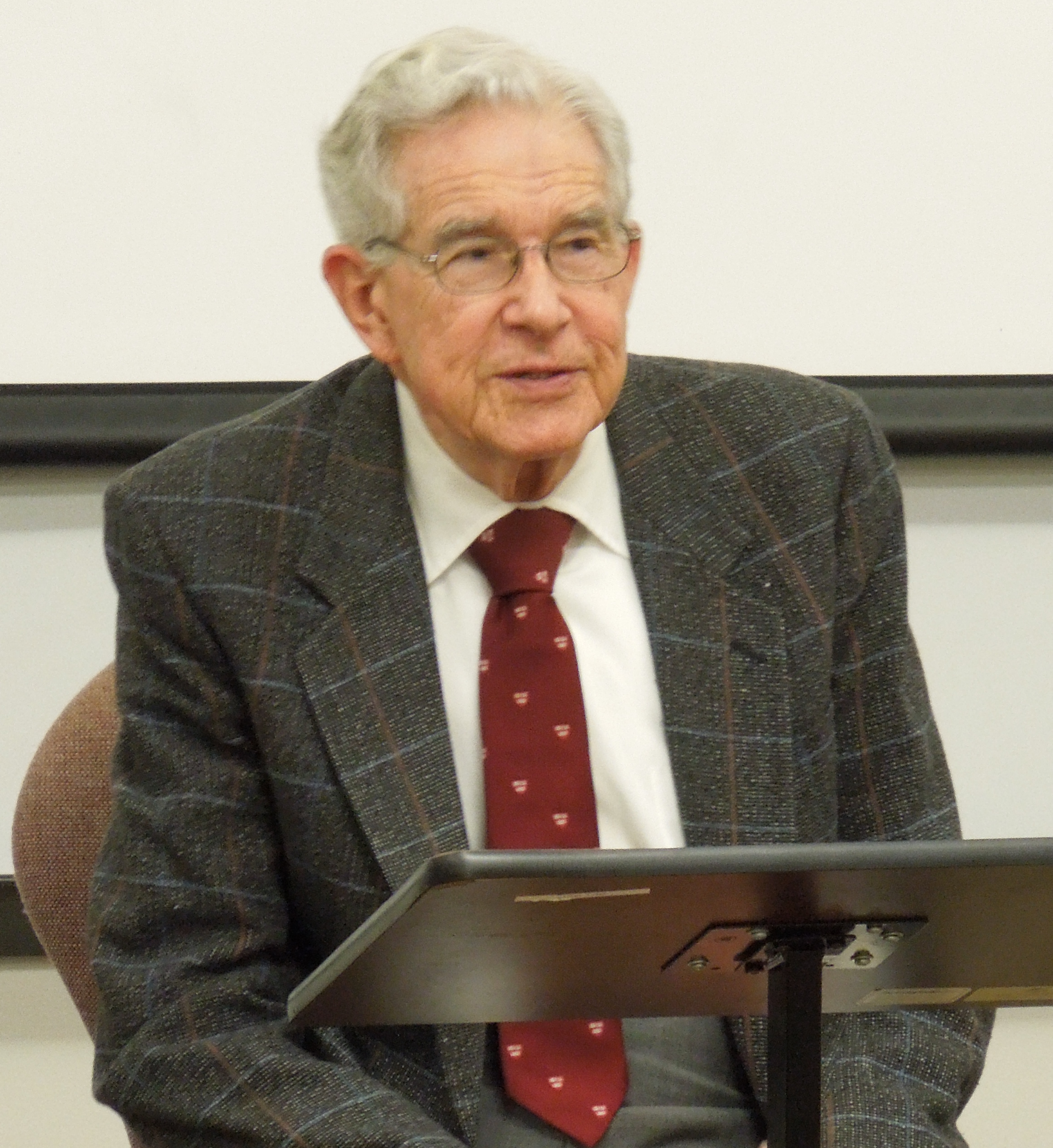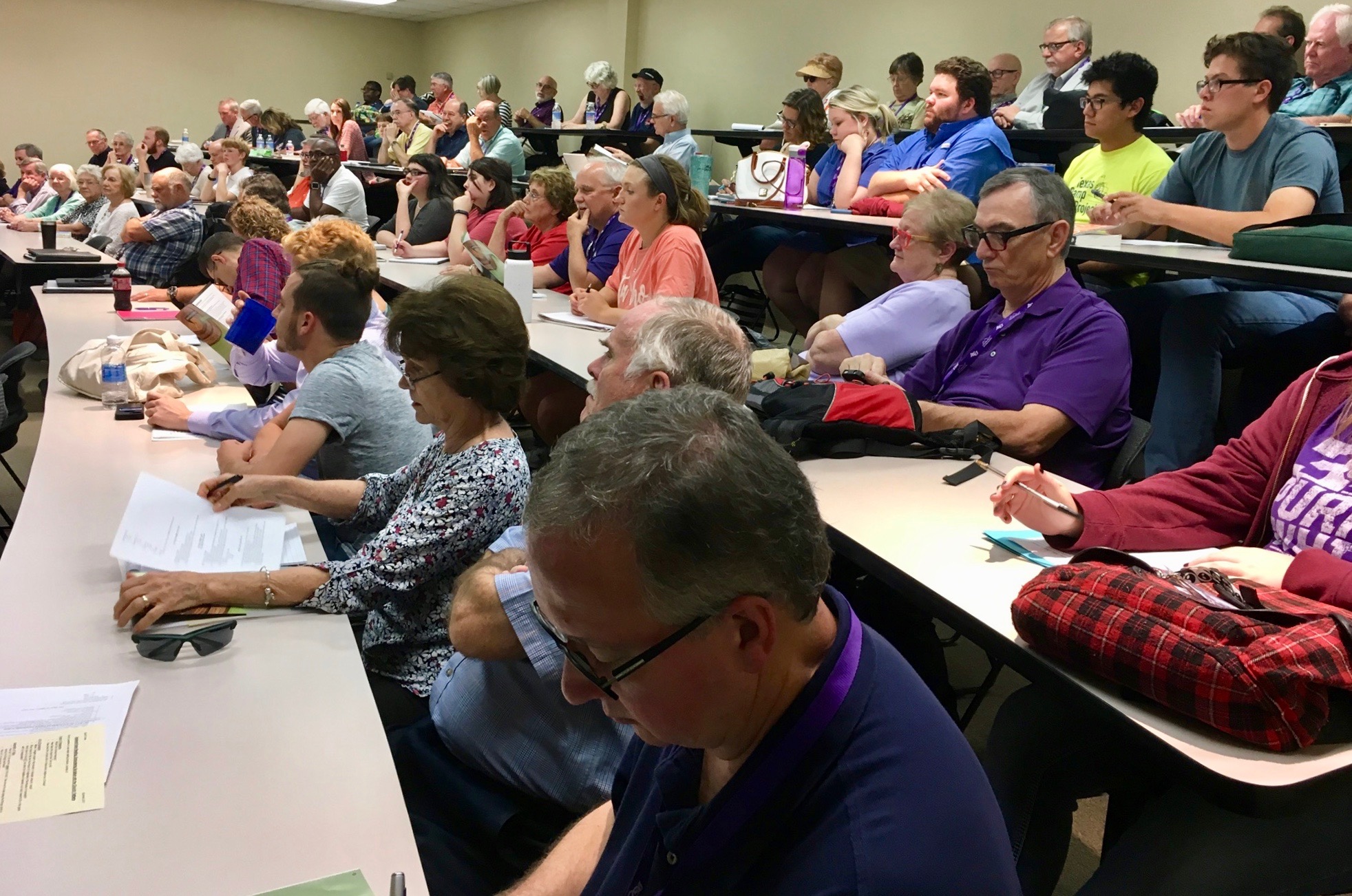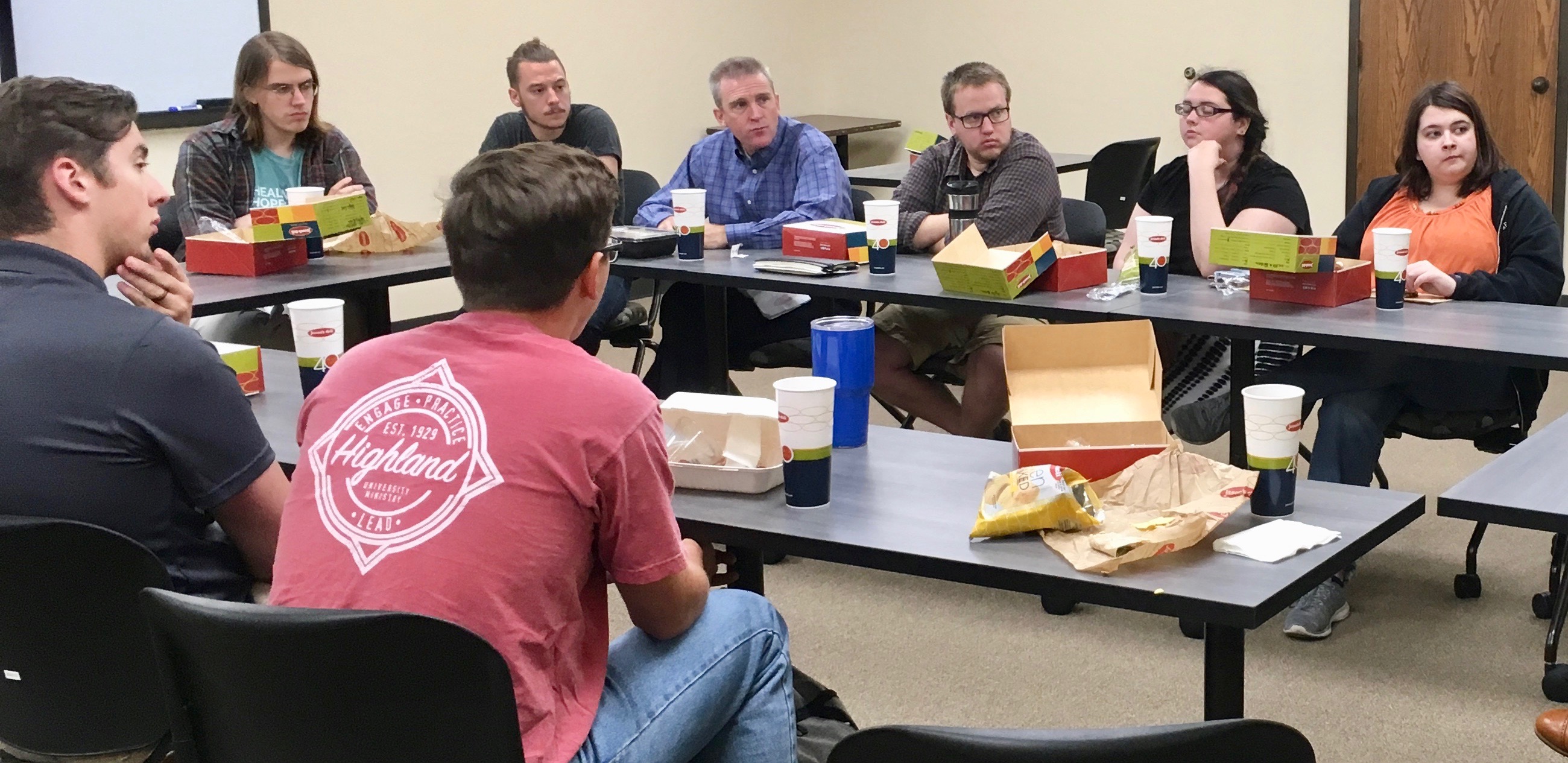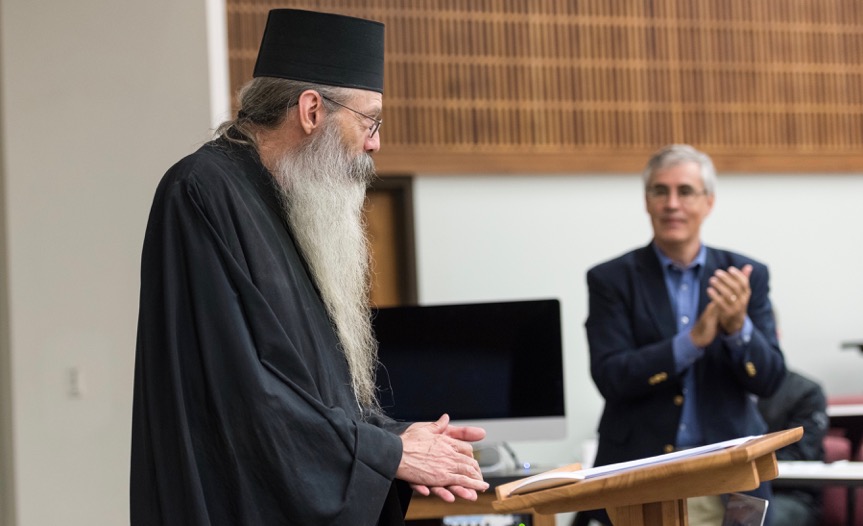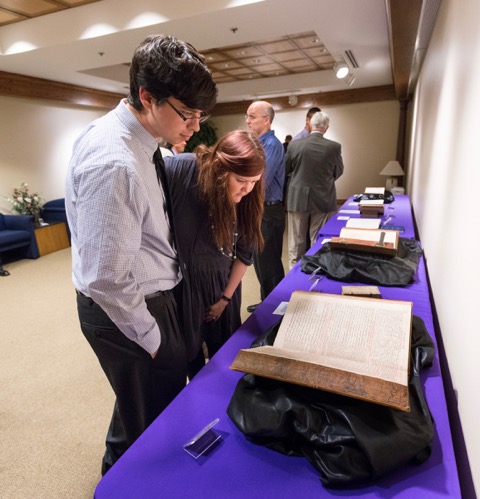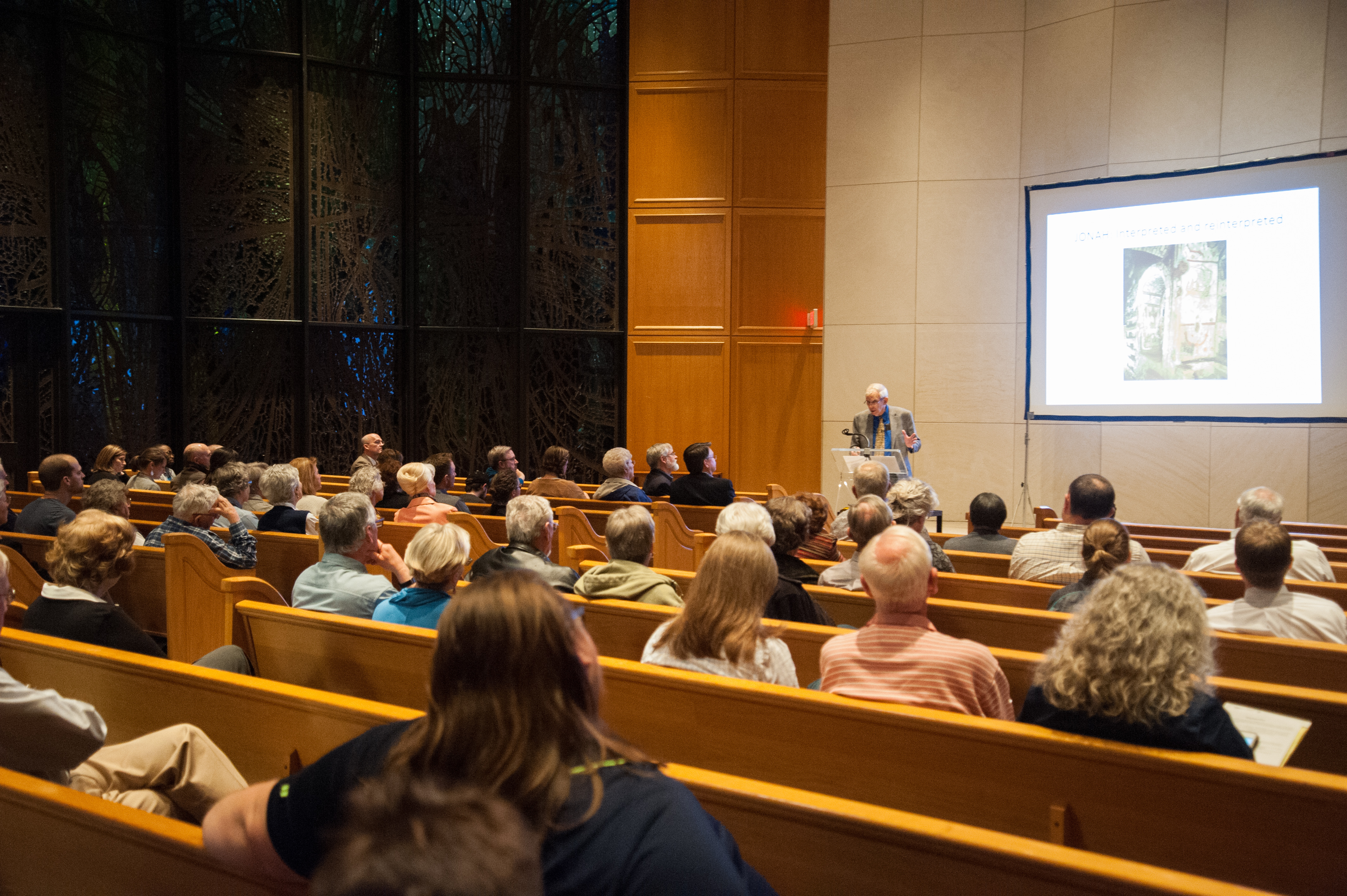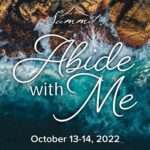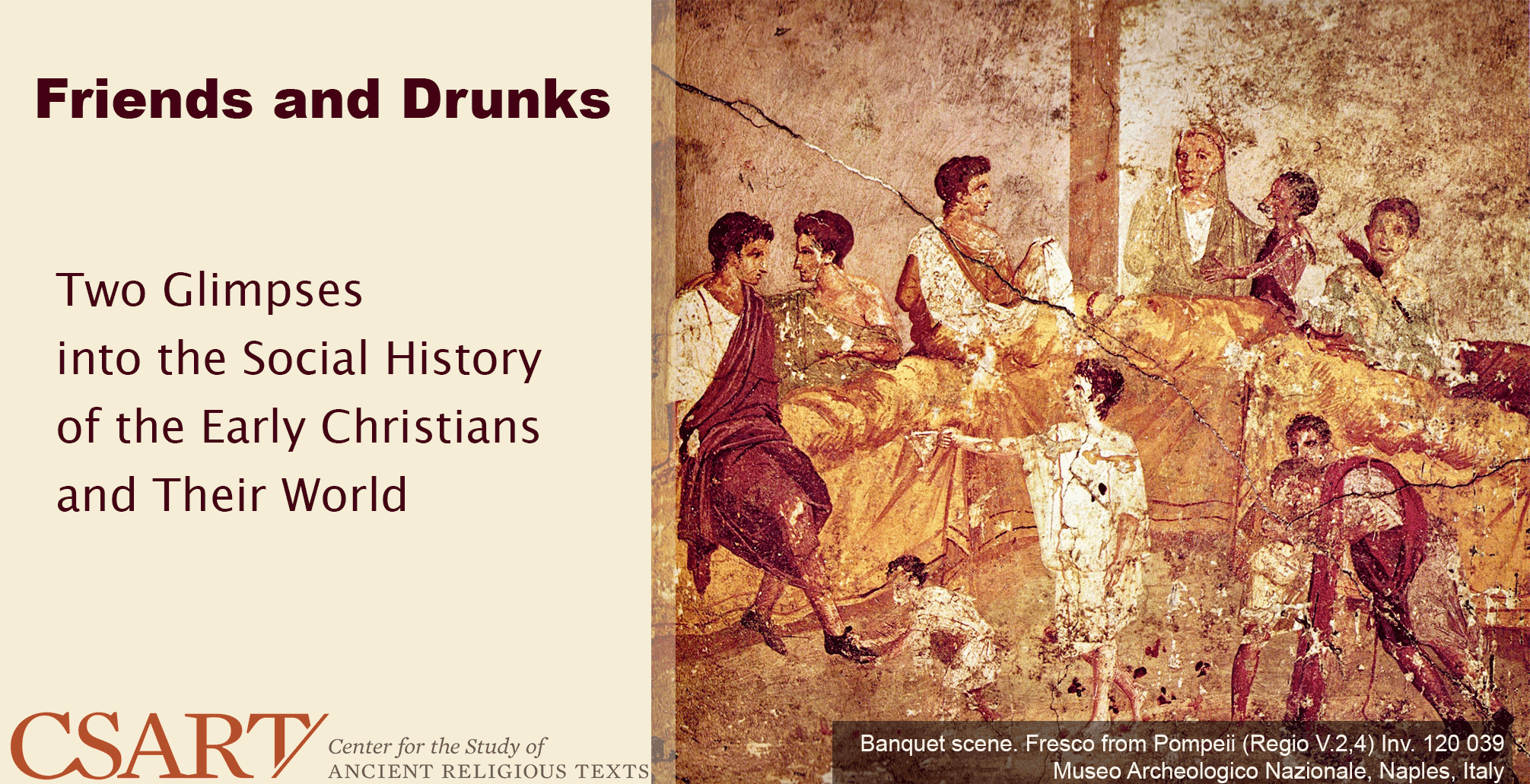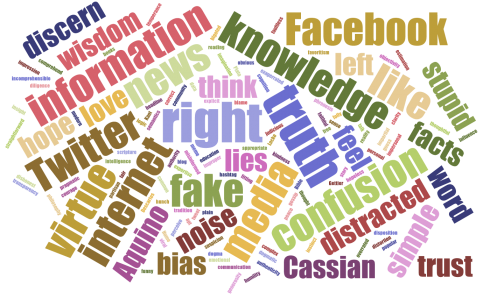Events
Type and Shadow

Christian art often features a bending of time and space: Old Testament imagery appears in the background of New Testament scenes, Bible characters are teleported to appear alongside other characters who lived hundreds of years later, and seemingly disparate stories are pointedly juxtaposed in a single artwork.
This practice is more than just a playful whim; it is a window into a Christological reading of scripture that the church has preserved and practiced since patristic times. This talk will explore some of the common—and not so common—artistic juxtapositions that not only help open the door into how the ancient church read scripture, but also provides helpful insights for contemporary readers of scripture too.
To learn more, we hope you’ll join us on the ACU campus for this presentation by ACU art professor Dan McGregor at 7:30 pm (central) on Tuesday April 2, 2024. The presentation is free and open to the public and will take place in the Packer Forum of ACU’s Brown Library. A presentation by Dan McGregor will be followed by an opportunity to ask questions and have discussion.
ACU students may attend the event for Spiritual Formation credit.
To stream the presentation, register here.
For more information, please contact us at csart@acu.edu.
 Dan McGregor (B.A., ACU; MFA, Savannah College of Art & Design) teaches drawing, Illustration, and art history classes in ACU’s Department of Art & Design. He is also a practicing painter and illustrator who loves painting outdoors and traveling with his family.
Dan McGregor (B.A., ACU; MFA, Savannah College of Art & Design) teaches drawing, Illustration, and art history classes in ACU’s Department of Art & Design. He is also a practicing painter and illustrator who loves painting outdoors and traveling with his family.
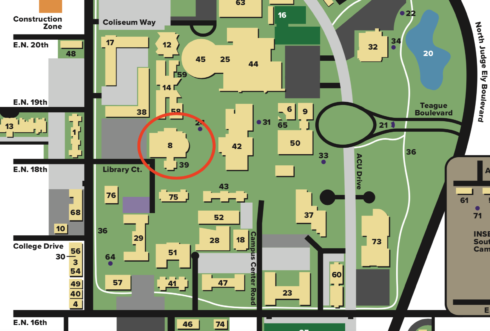
For a larger campus map, click here.
Genesis and its World
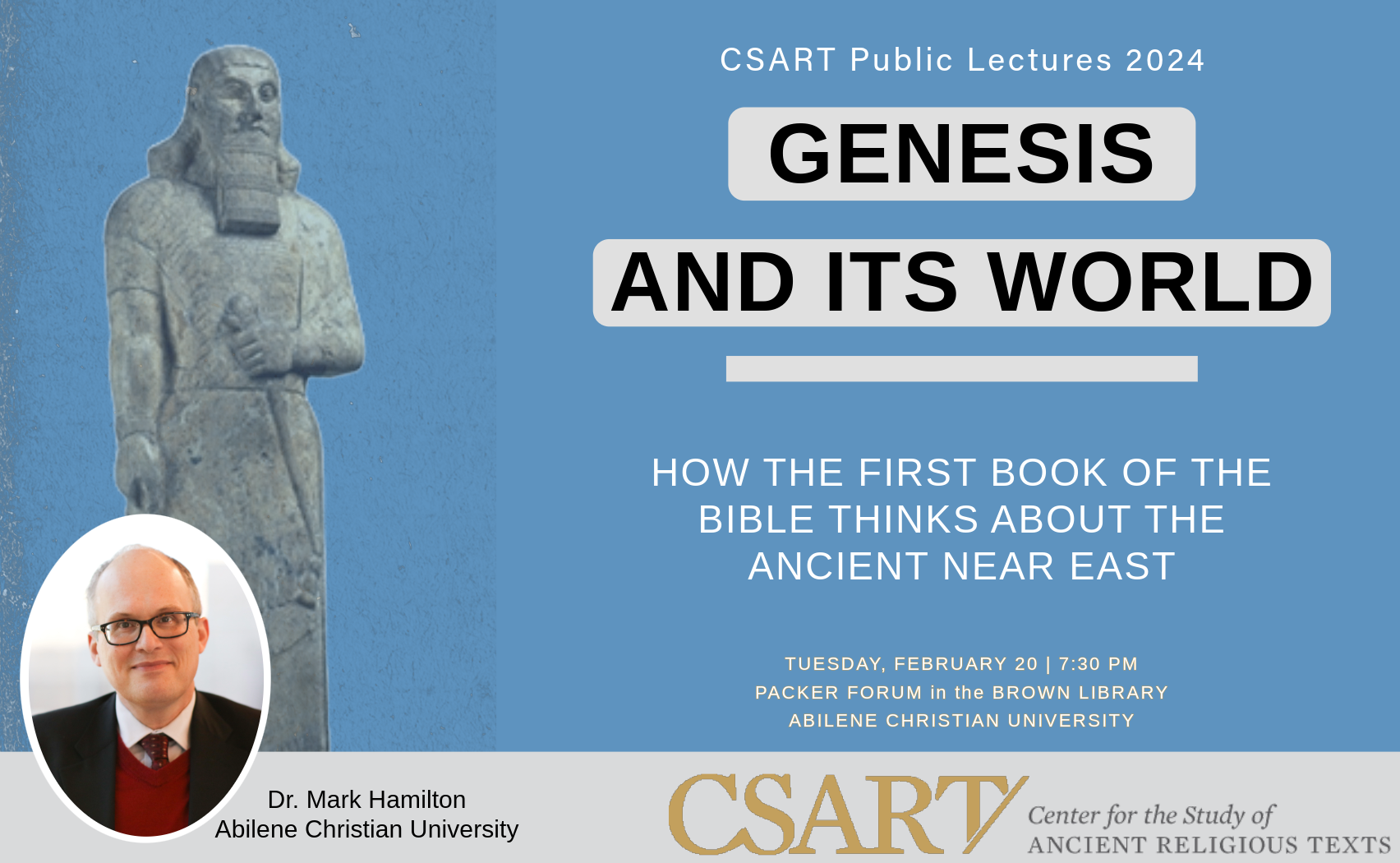
Few books in the Bible capture our imaginations the way the book of Genesis does! From the drama of creation, to the tragic experiences of early humans, to the hopeful promises offered to Abraham and his kin, Genesis is full of fascinating stories about God, the world, and humanity that are deeply formative of faith.
Drawing on the expertise of Old Testament professor Dr. Mark Hamilton, who is in the process of writing an extensive commentary on Genesis, this lecture explores the power and beauty of this unique book, helping us to appreciate the worlds of this book—both the world of its original setting, and the world that it seeks to shape today.
To learn more, we hope you’ll join us on the ACU campus for this presentation at 7:30 pm (central) on Tuesday February 20, 2024. The presentation is free and open to the public and will take place in the Packer Forum of ACU’s Brown Library. A presentation by Dr. Hamilton will be followed by an opportunity to ask questions and have discussion.
ACU students may attend the event for Spiritual Formation credit.
To stream the presentation, register here.
For more information, please contact us at csart@acu.edu.
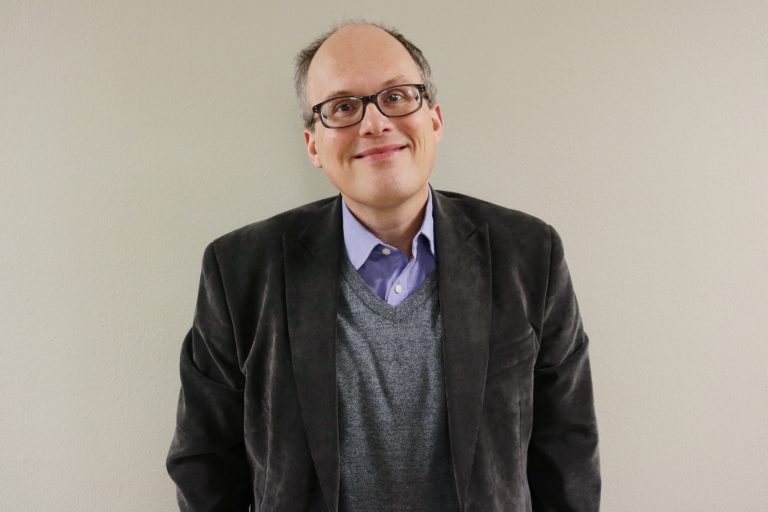 Mark Hamilton did graduate work at ACU before going on to do a Ph.D. on the Hebrew Bible at Harvard University. He is currently Robert and Kay Onstead Professor of Biblical Studies in ACU’s College of Biblical Studies. Dr. Hamilton is a gifted teacher, preaches regularly in churches, and is the author of many books, reviews, and articles for a variety of audiences.
Mark Hamilton did graduate work at ACU before going on to do a Ph.D. on the Hebrew Bible at Harvard University. He is currently Robert and Kay Onstead Professor of Biblical Studies in ACU’s College of Biblical Studies. Dr. Hamilton is a gifted teacher, preaches regularly in churches, and is the author of many books, reviews, and articles for a variety of audiences.

For a larger campus map, click here.
Getting Justice, Making Reparations: Paul, Race, Gender, and Enslavement
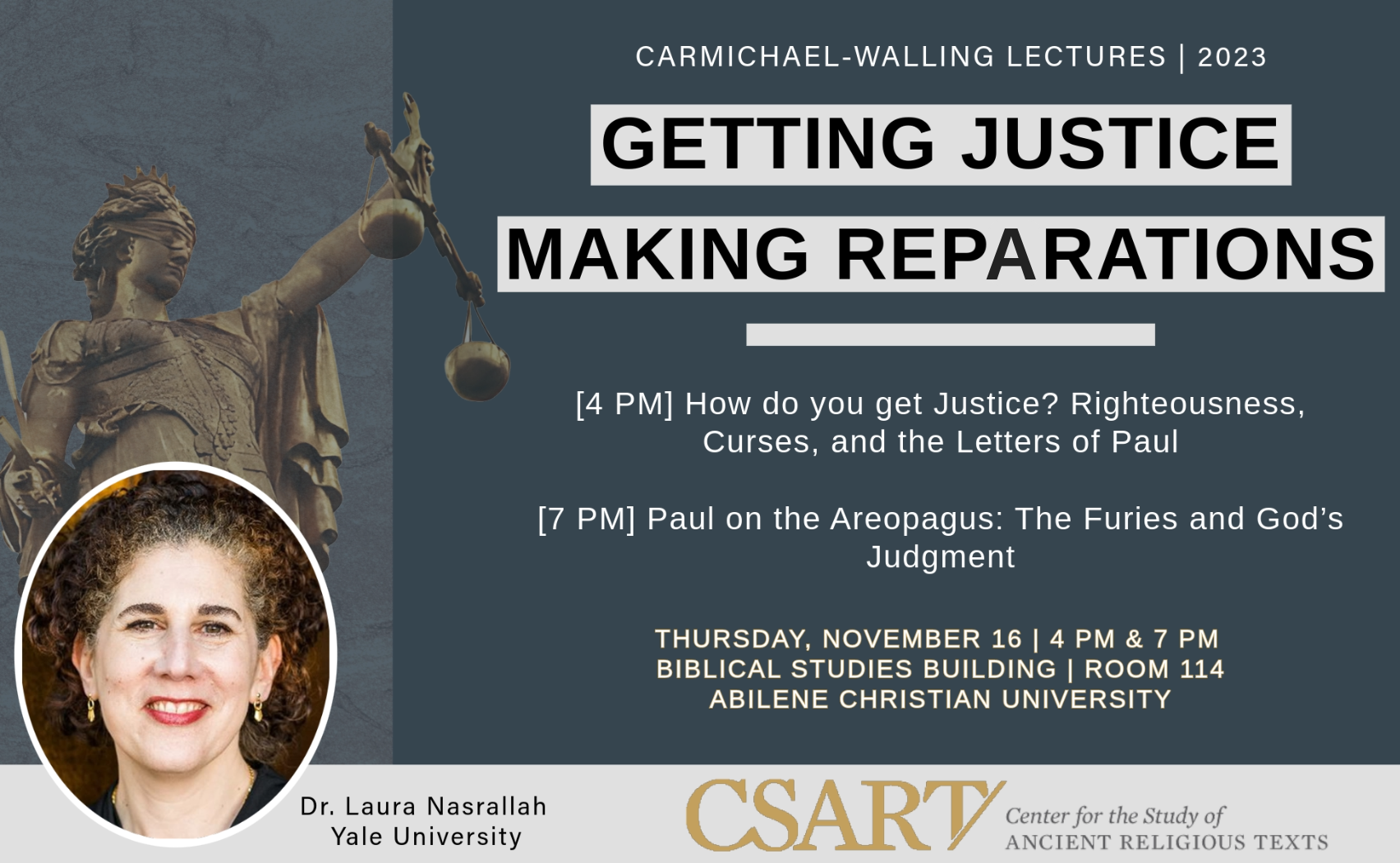
You are invited to join us for the annual Carmichael-Walling Lectures at Abilene Christian University on Thursday, November 16, 2023.
We are excited to welcome Dr. Laura Nasrallah of Yale University, who will give the 2023 Lectures on the theme, Getting Justice, Making Reparations: Paul, Race, Gender, and Enslavement.
4:00 p.m. – How do you get Justice? Righteousness, Curses, and the Letters of Paul
7:00 p.m. – Paul on the Areopagus: The Furies and God’s Judgment
Lectures are free, open to the public and will take place in Room 114 in the Onstead-Packer Biblical Studies Building on ACU’s campus in Abilene, Texas. For more information, contact csart@acu.edu.
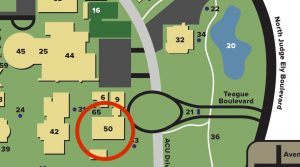
For a larger campus map, click here.
 Dr. LAURA NASRALLAH is Buckingham Professor of New Testament Criticism and Interpretation at Yale University, jointly appointed in the Divinity School and the Department of Religious Studies. Her research and teaching bring together New Testament and early Christian literature with the archaeological remains of the Mediterranean world, and often engage issues of colonialism, gender, race, status, and power. Her books include Ancient Christians and the Power of Curses: Magic, Aesthetics, and Justice (Cambridge University Press, 2024); Archaeology and the Letters of Paul (Oxford University Press, 2019; paperback, 2021); Christian Responses to Roman Art and Architecture: The Second-Century Church Amid the Spaces of Empire (Cambridge University Press, 2010); and An Ecstasy of Folly: Prophecy and Authority in Early Christianity (Harvard Theological Studies, distributed by Harvard University Press, 2004. She is also co-editor, with Elisabeth Schüssler Fiorenza, of Prejudice and Christian Beginnings: Investigating Race, Gender, and Ethnicity in Early Christian Studies (Fortress Press, 2009).
Dr. LAURA NASRALLAH is Buckingham Professor of New Testament Criticism and Interpretation at Yale University, jointly appointed in the Divinity School and the Department of Religious Studies. Her research and teaching bring together New Testament and early Christian literature with the archaeological remains of the Mediterranean world, and often engage issues of colonialism, gender, race, status, and power. Her books include Ancient Christians and the Power of Curses: Magic, Aesthetics, and Justice (Cambridge University Press, 2024); Archaeology and the Letters of Paul (Oxford University Press, 2019; paperback, 2021); Christian Responses to Roman Art and Architecture: The Second-Century Church Amid the Spaces of Empire (Cambridge University Press, 2010); and An Ecstasy of Folly: Prophecy and Authority in Early Christianity (Harvard Theological Studies, distributed by Harvard University Press, 2004. She is also co-editor, with Elisabeth Schüssler Fiorenza, of Prejudice and Christian Beginnings: Investigating Race, Gender, and Ethnicity in Early Christian Studies (Fortress Press, 2009).
She is currently working on two, maybe three books: The Letters of Paul: A Love/Hate Story (Eerdmans), a commentary on 1 Corinthians for the Hermeneia Series (Fortress Press), and a book on justice in antiquity, ideas for which she is testing in the lectures today.
Public Scholarship: What Constituencies Do We Serve?
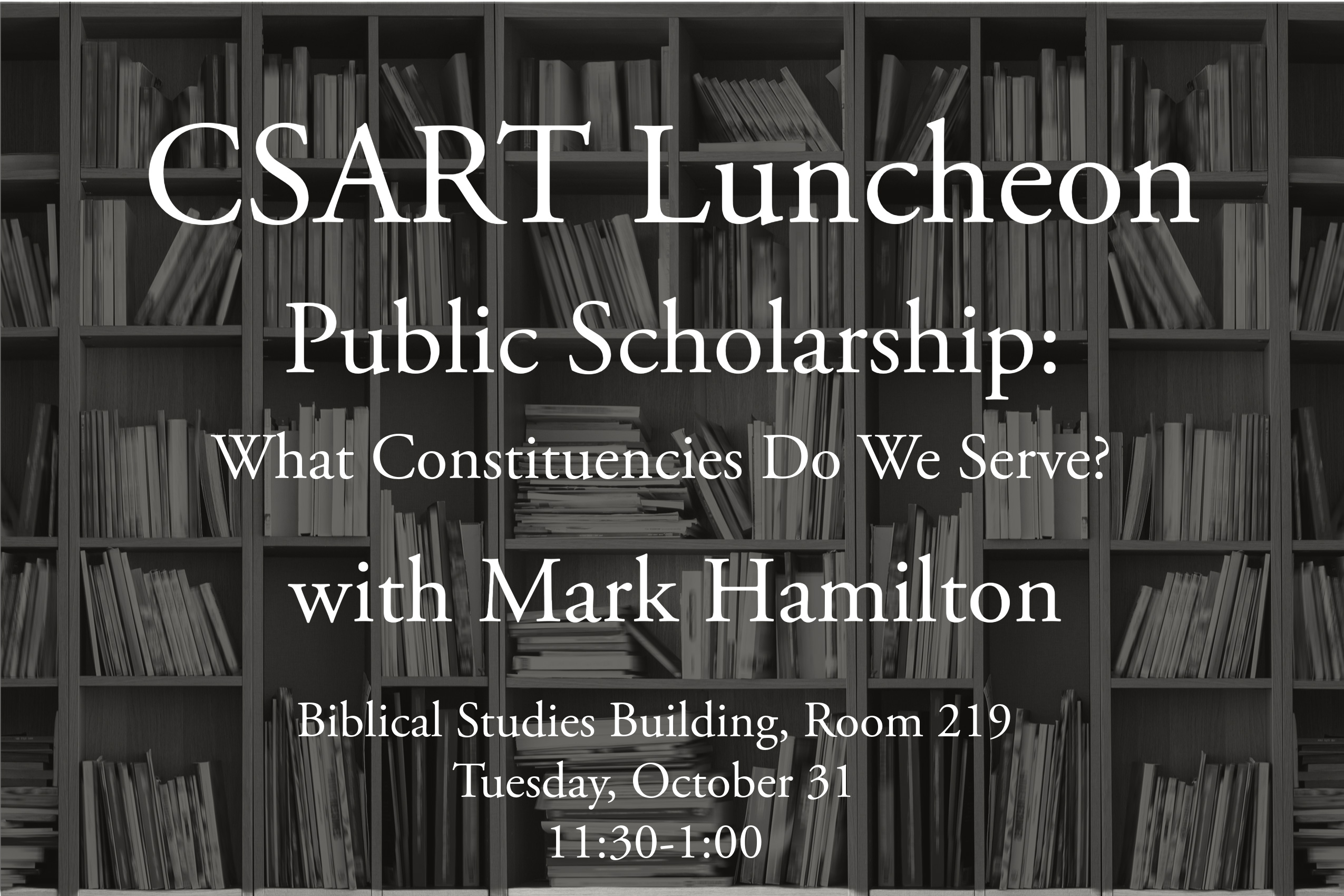
"Come, Lord Jesus:" Preaching Advent 2023

Get ready for the coming season…
The end of the calendar year brings the busy activities of the holiday season, but it also gives churches the opportunity to reflect on the coming of Jesus. During this season, traditionally known as Advent, many preachers focus their attention on biblical texts fitting the season. Some will follow traditional lectionary readings, while others will pursue related themes in a less formal way. Advent draws the church’s attention to the Lord’s comings—past, present, and future.
This panel of experienced preachers and pastoral scholars will discuss the challenges and opportunities for preaching in the upcoming Advent season. Whatever your own approach to the season, we invite you to join us to get fresh perspective and new ideas designed to help those preparing to preach in the weeks to come.
We hope you’ll join us at 1:00 pm (central) on Thursday, September 28, 2023 for a discussion featuring the following panel:
- Ben Fike, Cole Mill Road Church of Christ, Durham, North Carolina
- Tiffany Dahlman, Courtyard Church of Christ, Fayetteville, North Carolina
- Kelli Gibson, Graduate School of Theology, Abilene Christian University
- Mark Hamilton, Graduate School of Theology, Abilene Christian University
CLICK HERE to register for this Zoom webinar!
Faith Comes by Hearing (and Telling) the Word of God: Biblical Performance Criticism

"Like the Teacher"

In Luke 6:40, Jesus states, “A disciple is not above the teacher, but every disciple who is fully qualified will be like the teacher.” This brief observation from the Sermon on the Plain not only echoes other ancient understandings of the educational dynamics between teacher and disciple, but also points to an important literary dynamic in Luke-Acts. Readers of these two volumes have long noted the presence of various narrative correspondences between scenes and characters in the ministry of Jesus and those in the life of the early church.
Building from the assumption that Luke’s theology is communicated through the shape of the story, this lecture explores these literary parallels as critical components of the formative power of Luke-Acts for its readers, both ancient and contemporary.
To learn more, we hope you’ll join us on the ACU campus for this presentation at 7:30 pm (central) on Tuesday April 11, 2023. The presentation is free and open to the public and will take place in the Packer Forum of ACU’s Brown Library. A presentation by Dr. Pittman will be followed by an opportunity to ask questions and have discussion.
ACU students may attend the event for Spiritual Formation credit.
To stream the presentation, register here.
For more information, please contact us at csart@acu.edu.
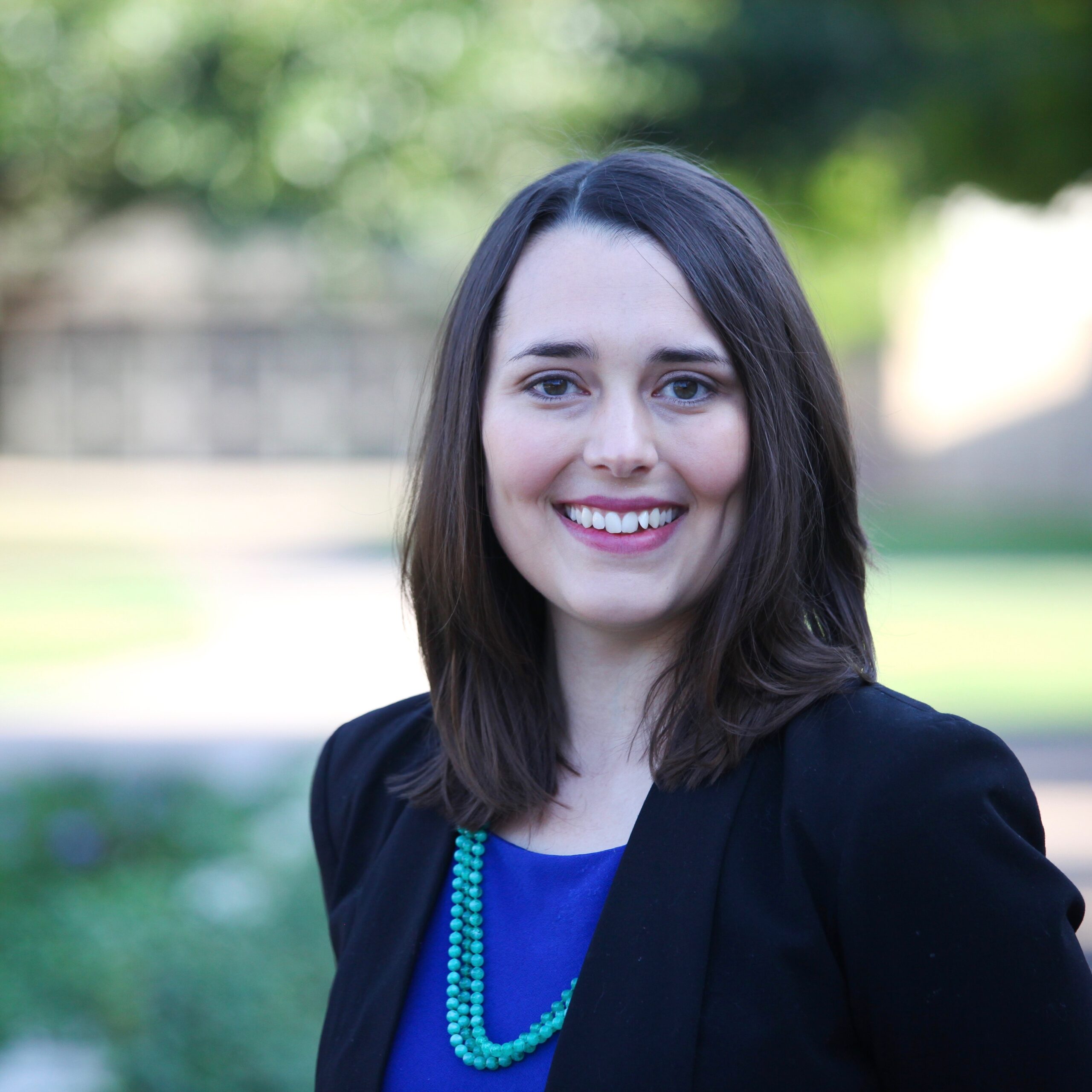 Amanda Pittman did undergraduate and graduate work at ACU before going on to do a Th.D. at Duke University, focused on Christian Formation & the New Testament. She is currently Associate Professor in the Department of Bible, Missions, and Ministry in ACU’s College of Biblical Studies. Dr. Pittman is a gifted teacher and preaches regularly in churches. Her recent publications have focused on the Acts of the Apostles, the spiritual formation of college students, and the impact of race on understanding Scripture.
Amanda Pittman did undergraduate and graduate work at ACU before going on to do a Th.D. at Duke University, focused on Christian Formation & the New Testament. She is currently Associate Professor in the Department of Bible, Missions, and Ministry in ACU’s College of Biblical Studies. Dr. Pittman is a gifted teacher and preaches regularly in churches. Her recent publications have focused on the Acts of the Apostles, the spiritual formation of college students, and the impact of race on understanding Scripture.

For a larger campus map, click here.
The Fourth Gospel: A Mystagogical Drama
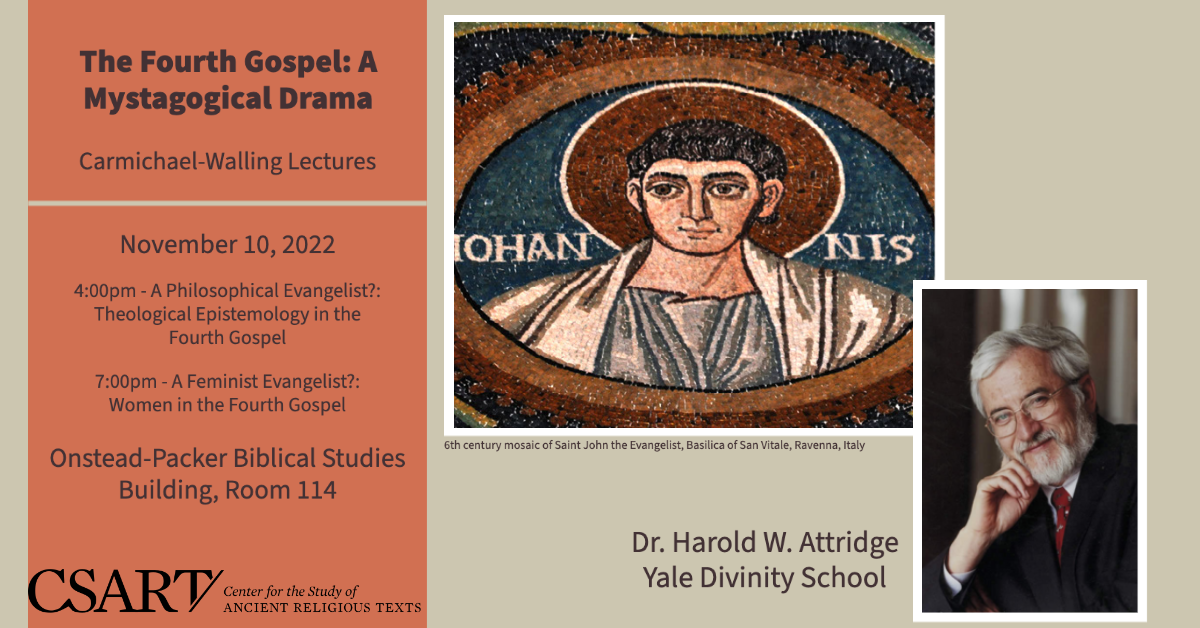
You are invited to join us for the annual Carmichael-Walling Lectures at Abilene Christian University on Thursday, November 10, 2022.
We are excited to welcome Dr. Harold W. Attridge of Yale Divinity School, who will give the 2022 Lectures on the theme, The Fourth Gospel: A Mystagogical Drama.
4:00 p.m. – A Philosophical Evangelist? Theological Epistemology in the Fourth Gospel
The Fourth Gospel can perhaps be best described as a “mystagogical drama,” inviting readers to encounter the Word of God enshrined in human words and in the process to deepen their faith in that Word. As part of that process the gospel engages in a set of questions that intrigued contemporary thinkers. These questions involve exploration of how sense perception and human words work to make God known. The evangelist, aware of philosophical discussion, provides a challenging response focused on the Word incarnate.
7:00 p.m. – A Feminist Evangelist? Women in the Fourth Gospel
Lectures are free, open to the public and will take place in Room 114 in the Onstead-Packer Biblical Studies Building on ACU’s campus in Abilene, Texas. For more information, contact csart@acu.edu.

For a larger campus map, click here.
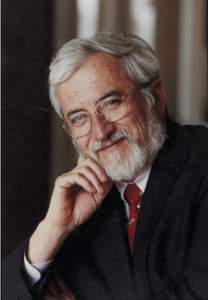 Dr. HAROLD W. ATTRIDGE is Sterling Professor of Divinity at Yale Divinity School. He has made scholarly contributions to New Testament exegesis and to the study of Hellenistic Judaism and the history of the early Church. His publications include Essays on John and Hebrews, Hebrews: A Commentary on the Epistle to the Hebrews, The Interpretation of Biblical History in the Antiquitates Judaicae of Flavius Josephus, Nag Hammadi Codex I: The Jung Codex, and The Acts of Thomas, as well as numerous book chapters and articles in scholarly journals. He has been active in the Society of Biblical Literature and served as president of the society in 2001 and in the Catholic Biblical Association, of which he was president in 2011-12. He was elected to be a Fellow of the American Academy of Arts and Sciences in 2015.
Dr. HAROLD W. ATTRIDGE is Sterling Professor of Divinity at Yale Divinity School. He has made scholarly contributions to New Testament exegesis and to the study of Hellenistic Judaism and the history of the early Church. His publications include Essays on John and Hebrews, Hebrews: A Commentary on the Epistle to the Hebrews, The Interpretation of Biblical History in the Antiquitates Judaicae of Flavius Josephus, Nag Hammadi Codex I: The Jung Codex, and The Acts of Thomas, as well as numerous book chapters and articles in scholarly journals. He has been active in the Society of Biblical Literature and served as president of the society in 2001 and in the Catholic Biblical Association, of which he was president in 2011-12. He was elected to be a Fellow of the American Academy of Arts and Sciences in 2015.
Refining Faith: Preaching, Teaching, and Praying with 1 Peter
 October 13–14, 2022
October 13–14, 2022
A CSART-led Summit event on the ACU campus. This general interest community will focus on one of the church’s great treasures: the First Epistle of Peter. With its emphasis on faithful endurance and dynamic mission through participation in the sufferings, salvation, and holiness of Jesus, 1 Peter is as relevant today as it was in the ancient church. We will look at 1 Peter from several different angles, seeking to experience it as a timely and fresh resource for preaching, teaching, and spiritual life
The book of 1 Peter is one of the treasures of the New Testament. Tucked away toward the end of the Bible and not having been written by Paul, it doesn’t get as much attention as some of the more famous letters like Romans or Ephesians. Plus, its shortness might lead some readers to think that it’s not as substantial as other books. But the church has known for 2,000 years that this little letter is a deep well of spiritual wisdom, and we will benefit by taking a long drink from these waters.
This year at Summit, you will have the opportunity to interact with a variety of presenters, including several current and former ACU Bible faculty. Curt Niccum, Cliff Barbarick, and David Wray will help you think about preaching and teaching from the text, and Houston Heflin, David Kneip, and Nic Dunbar will lead you in considering how the text assists us with spiritual formation and worship. And there’s more! Come join us as we focus our hearts and minds on 1 Peter.
To learn more about Summit and to sign up for the event, visit the Summit website.
COMMUNITY FACILITATORS
 Jeff Childers currently serves as the Carmichael-Walling chair of New Testament and Early Christianity in the Graduate School of Theology at Abilene Christian University. As a university professor, his teaching, research, and writings explore the history of the Bible and the world of the early church, especially ancient Eastern Christianity. As a churchman and consultant, Jeff speaks and writes on such topics as preparing children for baptism, adapting historic practices of prayer for contemporary spiritual life, and bringing the sacraments into focus in Churches of Christ. Jeff and his wife, Linda, worship with the Highland Church of Christ in Abilene, Texas.
Jeff Childers currently serves as the Carmichael-Walling chair of New Testament and Early Christianity in the Graduate School of Theology at Abilene Christian University. As a university professor, his teaching, research, and writings explore the history of the Bible and the world of the early church, especially ancient Eastern Christianity. As a churchman and consultant, Jeff speaks and writes on such topics as preparing children for baptism, adapting historic practices of prayer for contemporary spiritual life, and bringing the sacraments into focus in Churches of Christ. Jeff and his wife, Linda, worship with the Highland Church of Christ in Abilene, Texas.
 David Kneip has been a professor in ACU’s Department of Bible, Missions and Ministry for over a decade, teaching courses in church history, worship, and the New Testament. He also serves the Siburt Institute as associate director, and his responsibilities include overseeing a variety of events focused on churches and church leaders. These twin roles bring together David’s love of students and ministers, and his experiences working in the classroom and in congregations. In addition to his teaching background, David has served churches in Texas, North Carolina, and Indiana as a youth minister and worship minister. He and his wife, Cynthia, have two daughters, and they co-lead an adult Bible class at Highland Church of Christ in Abilene, Texas.
David Kneip has been a professor in ACU’s Department of Bible, Missions and Ministry for over a decade, teaching courses in church history, worship, and the New Testament. He also serves the Siburt Institute as associate director, and his responsibilities include overseeing a variety of events focused on churches and church leaders. These twin roles bring together David’s love of students and ministers, and his experiences working in the classroom and in congregations. In addition to his teaching background, David has served churches in Texas, North Carolina, and Indiana as a youth minister and worship minister. He and his wife, Cynthia, have two daughters, and they co-lead an adult Bible class at Highland Church of Christ in Abilene, Texas.
The First One Hundred Years of Christianity
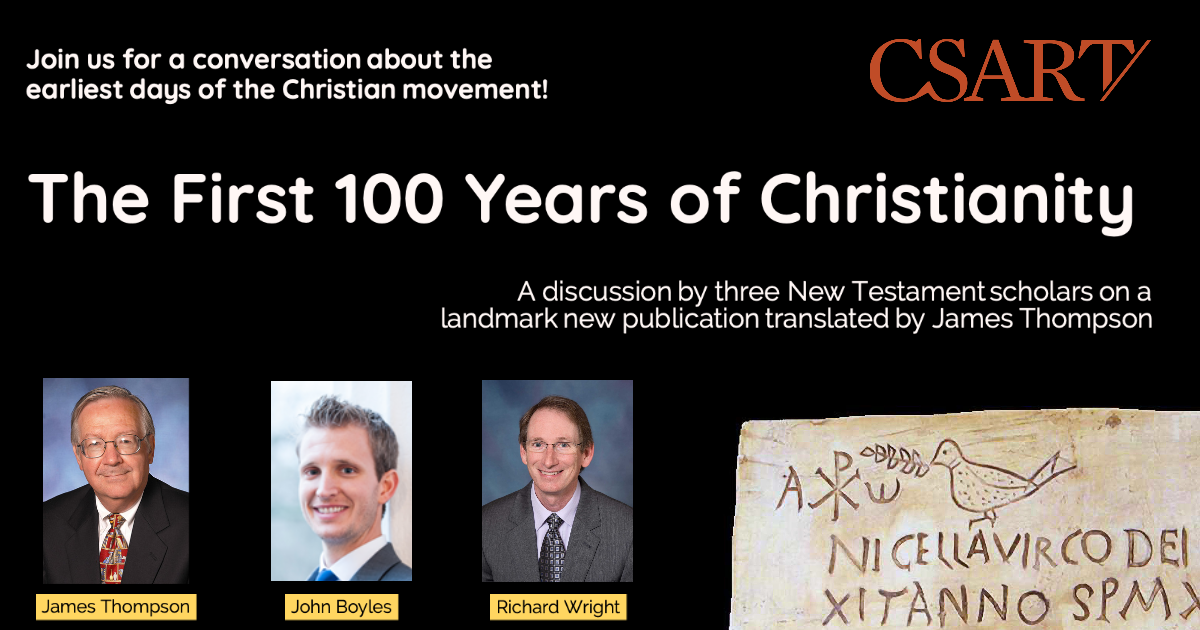
Join us for a special presentation and discussion hosted by ACU’s Center for the Study of Ancient Religious Texts (CSART), at Abilene Christian University on Tuesday, March 22, 2022 at 7:30 p.m. on the ACU campus.
When ACU scholar-in-residence James W. Thompson translated Udo Schnelle’s landmark The First One Hundred Years of Christianity: An Introduction to its History, Literature, and Development from German into English (Baker Academic, 2020; 662 pages), a major tool for the study of the New Testament became available to English readers. Translations of important scholarly works such as this can make a significant impact for those who study the Bible. In this session, Prof. Thompson will discuss his motivations and the process for doing this important work.
New Testament scholars Richard Wright and John H. Boyles will respond to the work, clarifying why translation projects like this matter and offering some suggestions for ministers, Bible students, and scholars about who how best to use an introduction like this in their own study.
This event is free, open to the public, and will take place in the Packer Forum of the Brown Library on ACU’s campus. For more information, contact csart@acu.edu.
*For updated guidelines regarding masks and COVID protocols on the ACU campus, see ACU’s COVID information pages.
To stream the presentation, register here.
We hope you will join us for this special evening!
James W. Thompson (PhD, Vanderbilt University) is scholar-in-residence in the Graduate School of Theology at Abilene Christian University. He has published numerous books and articles in the area of New Testament Studies, including: Preaching Hebrews and 1 Peter (Proclamation: Preaching the New Testament) (Cascade Books, 2021); Strangers on the Earth: Philosophy and Rhetoric in Hebrews (Cascade Books, 2020); Apostle of Persuasion: Theology and Rhetoric in the Pauline Letters (Baker Academic, 2020); The Church according to Paul: Rediscovering the Community Conformed to Christ (Baker Academic, 2014); Moral Formation according to Paul: The Context and Coherence of Pauline Ethics (Baker Academic, 2011); Hebrews (Paideia: Commentaries on the New Testament; Baker Academic, 2008); and Pastoral Ministry according to Paul: A Biblical Vision (Baker Academic, 2006).
John H. Boyles (PhD, Emory University) is Assistant Professor of New Testament in the Department of Bible, Missions, and Ministry at Abilene Christian University. His research interests include the reception history of the Bible and the social history of the ancient Mediterranean as it can inform the study of the New Testament, especially the lived experience in groups and associations. He teaches courses in biblical interpretation and biblical languages. He has recently published articles on teaching the Bible, ethics, and issues of race in undergraduate classrooms and articles on the Bible in film in The Encyclopedia of the Bible and its Reception (De Gruyter, 2017).
Richard Wright (PhD, Brown University) is professor of New Testament in the Graduate School of Theology at Abilene Christian University. His research has focused on the significance of understanding the social world of the early Christians for understanding the New Testament, a perspective that informs his numerous journal articles and contributions to volumes of collected essays. He teaches classes in New Testament text, the backgrounds to the New Testament, and Greek and Latin. He recently co-edited the volume of collected essays, Ethics in Contexts (Pickwick, 2019) and has prepared A Reader in Biblical Greek that will be published soon.

For a larger campus map, click here.
Learn about the Ministry of Bible Translation
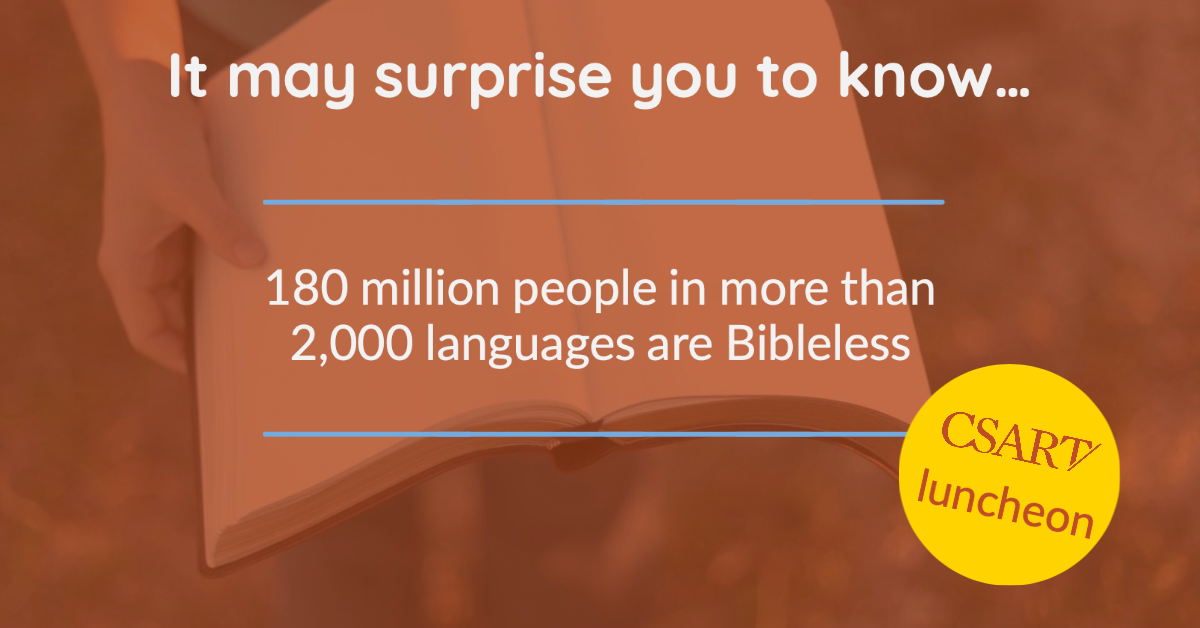
“How can I use my skills to provide God’s Word to people in the world who don’t have a Bible in their language?”
We hope you’ll join us for an informal lunch with two teammates from Pioneer Bible Translators, where you’ll have the opportunity to learn and ask questions about the need for Bible translators, the day-to-day ministry and process of translation, and opportunities to use your training in biblical languages to help finish the task of Bible translation in this generation.
We will meet Wednesday February 23 at 11:30 am in Biblical Studies Building room 117.
For more information, click here to email CSART.
Lent 2022: Preaching in a Time of COVID
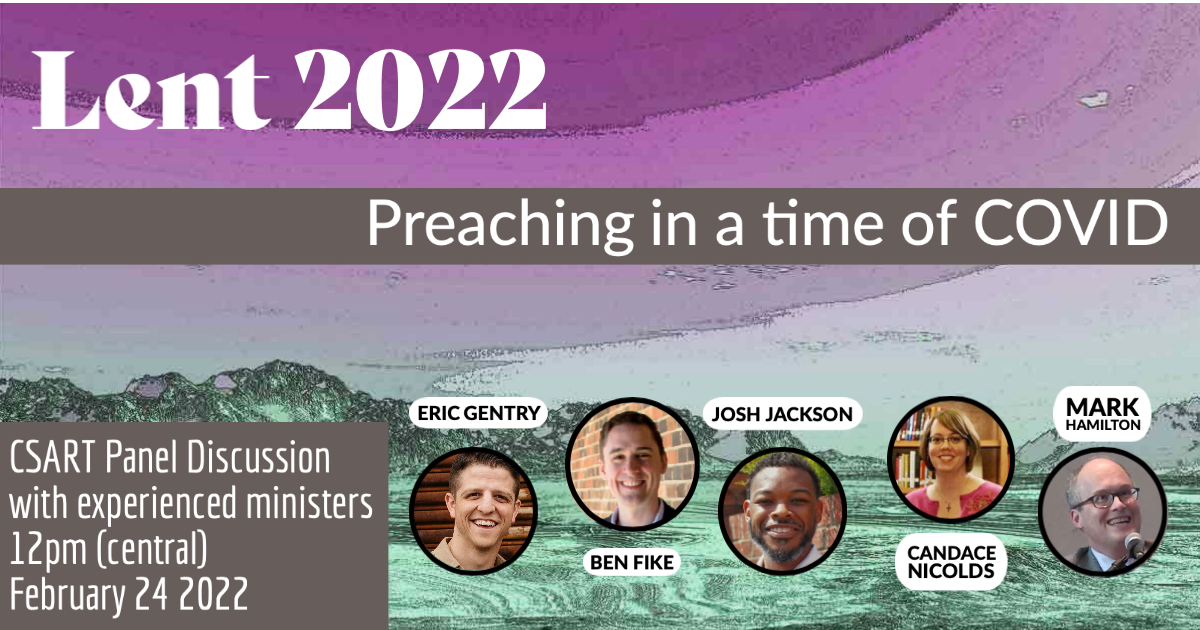
A conversation with experienced ministers
The weeks before Easter provide a great opportunity to explore our faith and clarify our relationships to God and our neighbors. But leading a church during this time requires renewed attention to the meaning of God’s work in Christ as expressed through Scripture.
This panel will discuss the challenges and opportunities for preaching, and ministry more generally, during this season. Listen to experienced ministers discuss their work as they encounter together the season of Lent, 2022.
We hope you’ll join us at 12:00 pm (central) on Thursday, February 24, 2022 for a discussion featuring the following panel:
- Ben Fike, Cole Mill Road Church of Christ, Durham, North Carolina
- Eric Gentry, Highland Church of Christ, Memphis, Tennessee
- Mark Hamilton, Graduate School of Theology, Abilene Christian University
- Josh Jackson, Rural Hill Church of Christ, Antioch, Tennessee
- Candace Nicolds, Brookline Church of Christ, Brookline, Massachusetts
CLICK HERE to register for this Zoom webinar!
The Word of the Lord

The church has long confessed that the Bible is the word of the Lord to and for the Lord’s people. Christians therefore treasure the Bible, in worship and in their daily lives.
But how should they read the Bible? How should they approach it, and with what expectations? What is the Bible for in the first place? These perennial questions sometimes inspire and sometimes haunt the church.
In his lecture Brad East presents a vision of the church’s life with Scripture that understands the text to be a means of Christ’s grace given for the sake of Christ’s body. Believers are right, then, to come to the text hoping to hear from the living Christ, whom they know in faith, a living word that imparts life to his beloved bride. That expectation in turn should shape how we understand and how we read the sacred canon.
To learn more, we hope you’ll join us on the ACU campus for this presentation at 7:30 pm (central) on Tuesday February 15, 2022. The presentation is free and open to the public and will take place in the Packer Forum of ACU’s Brown Library.* A presentation by Dr. East will be followed by an opportunity to ask questions and have discussion.
*For updated guidelines regarding masks and COVID protocols on the ACU campus, see ACU’s COVID information pages.
To stream the presentation, register here.
For more information, please contact us at csart@acu.edu.
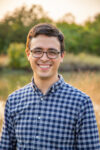 Brad East did his BA at ACU before going on to do graduate work at Emory University and complete a PhD at Yale University. He is currently Assistant Professor of Theology in the Department of Bible, Missions, and Ministry in ACU’s College of Biblical Studies. Dr. East speaks regularly to church leaders and in churches. His recent publications have focused on Scripture, including his recently published book, The Doctrine of Scripture (Cascade Companions; Eugene, OR: Cascade Books, 2021), and a book that will appear later this Spring: The Church’s Book: Theology of Scripture in Ecclesial Context (Grand Rapids: Eerdmans, 2022). He is currently working on: The Church: A Guide to the People of God, to be published by Lexham Press in 2023.
Brad East did his BA at ACU before going on to do graduate work at Emory University and complete a PhD at Yale University. He is currently Assistant Professor of Theology in the Department of Bible, Missions, and Ministry in ACU’s College of Biblical Studies. Dr. East speaks regularly to church leaders and in churches. His recent publications have focused on Scripture, including his recently published book, The Doctrine of Scripture (Cascade Companions; Eugene, OR: Cascade Books, 2021), and a book that will appear later this Spring: The Church’s Book: Theology of Scripture in Ecclesial Context (Grand Rapids: Eerdmans, 2022). He is currently working on: The Church: A Guide to the People of God, to be published by Lexham Press in 2023.

For a larger campus map, click here.
Strange Religion
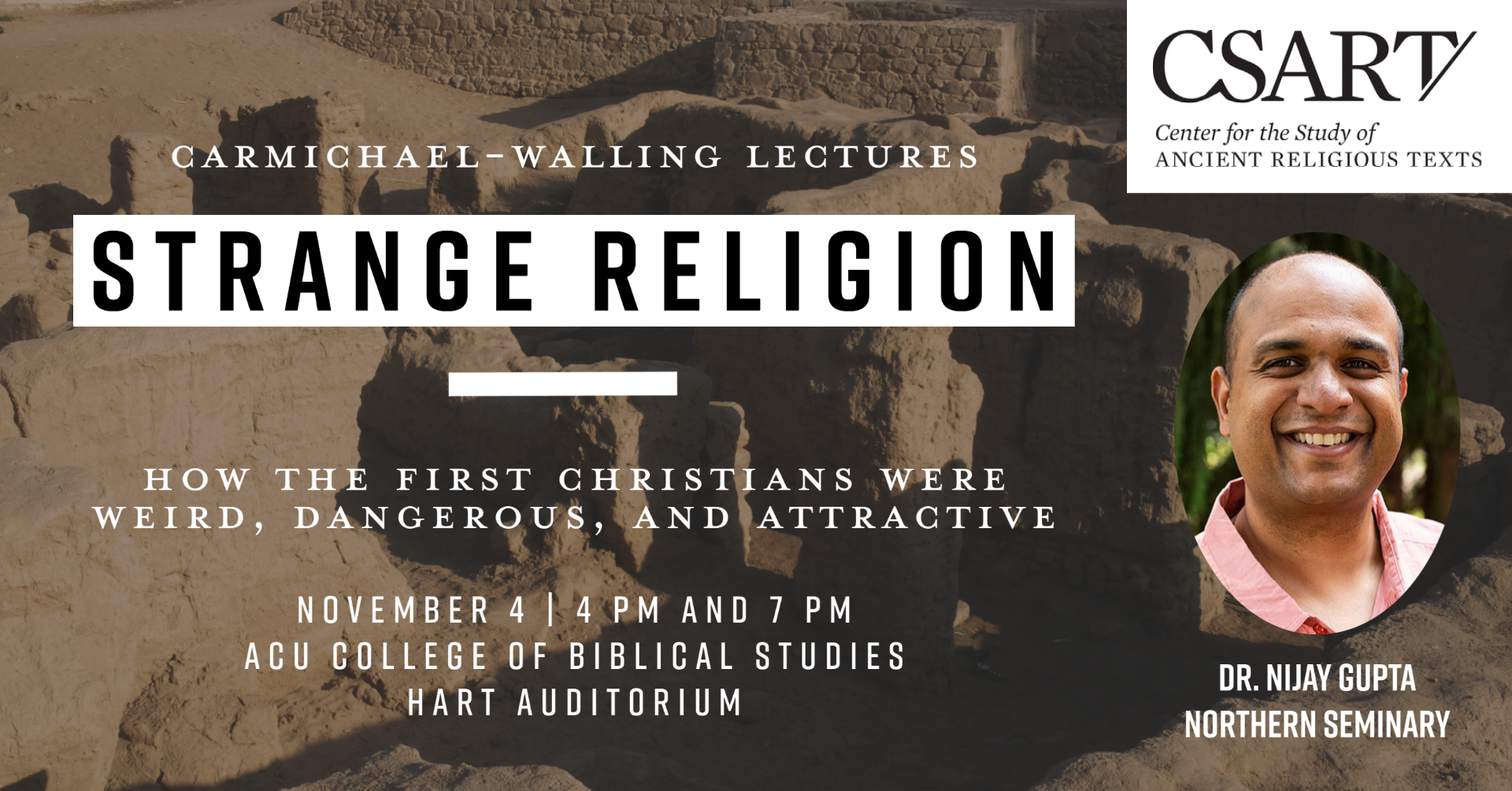
You are invited to join us for the annual Carmichael-Walling Lectures at Abilene Christian University on Thursday, November 4, 2021.
We are excited to welcome Dr. Nijay Gupta of Northern Seminary, who will give the 2021 Lectures on the theme, Strange Religion: How the First Christians Were Weird, Dangerous, and Attractive.
4:00 p.m. – People of Faith: Why the first Christians Called Themselves ‘Believers’
Even though ancient people were “religious,” they didn’t typically dwell on the language of “faith” or “belief.” But the first Christians were seemingly obsessed with belief language. Why is that? We will explore why the people of Jesus called themselves “believers” and how that shaped their understanding of God and God’s world.
7:00 p.m. – Cult without Smoke and Blood: The Strange Worship of the Early Christians
Lectures are free, open to the public and will take place in Hart Auditorium in the Onstead-Packer Biblical Studies Building on ACU’s campus in Abilene, Texas. For more information, contact csart@acu.edu.
*Masks and social distancing are required. For mandatory guidelines, see ACU’s COVID information pages.
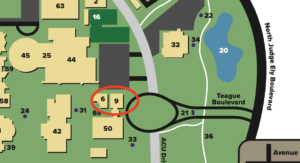
For a larger campus map, click here.
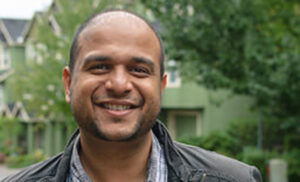 Dr. NIJAY GUPTA teaches New Testament courses at Northern Seminary, working closely with the Master of Arts in New Testament and the Doctor in Ministry in New Testament Context cohorts. He has been teaching for more than a decade. Dr. Gupta is the author of several important works, including Paul and the Language of Faith, A Beginner’s Guide to New Testament Studies, and The State of New Testament Studies. He currently serves as the Editor-in-Chief of the Bulletin for Biblical Research, Co-Editor of The Bible in God’s World series with Scot McKnight, and as a member of the Editorial Board of both Ex Auditu and of the Biblical Interpretation Series. He is a graduate of the University of Durham.
Dr. NIJAY GUPTA teaches New Testament courses at Northern Seminary, working closely with the Master of Arts in New Testament and the Doctor in Ministry in New Testament Context cohorts. He has been teaching for more than a decade. Dr. Gupta is the author of several important works, including Paul and the Language of Faith, A Beginner’s Guide to New Testament Studies, and The State of New Testament Studies. He currently serves as the Editor-in-Chief of the Bulletin for Biblical Research, Co-Editor of The Bible in God’s World series with Scot McKnight, and as a member of the Editorial Board of both Ex Auditu and of the Biblical Interpretation Series. He is a graduate of the University of Durham.
Languages in Ministry
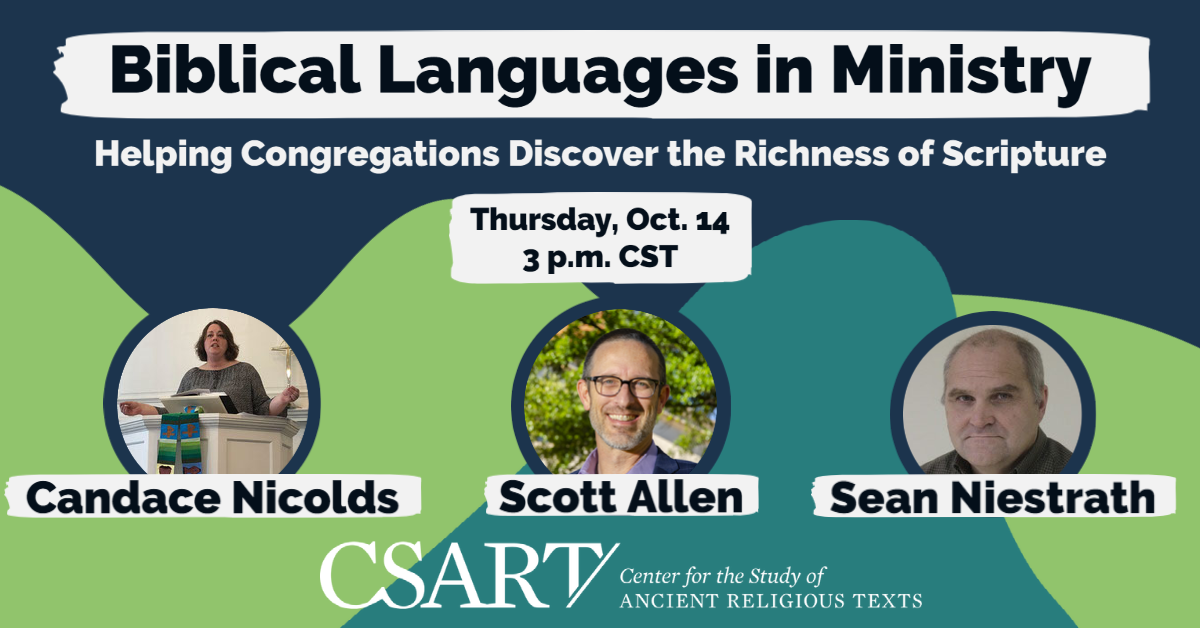
A conversation with experienced ministers
“Learning Greek and Hebrew was the most exciting thing I ever did! What do I do now?”
Realistic quote from a typical Bible student
Acquiring and applying language skills is not easy. Outside the academy, in the real world of daily ministry, how does knowing biblical languages help me in:
- Bible study?
- sermon and lesson preparation?
- personal devotion?
- understanding the world of the Bible?
- shaping my attitude towards scripture?
How do I keep up my skills? Is it necessary to be a total expert in the languages to make them useful in ministry? What are ways not to use my scholarship in ministry, what are some things to avoid?
We hope you’ll join us for a panel discussion with three experienced ministers who will coach us in helping congregations discover the richness of scripture:
- Scott Allen, Johnson Street Church, San Angelo, Texas
- Candace Nicolds, Brookline Church, Brookline, Massachusetts
- Sean Niestrath, Pennyrile Church, Madisonville, Kentucky
Join us on at 3:00 pm (central) on Thursday, October 14, 2021. You can gather with us in room 129 in the College of Biblical Studies on the ACU campus, or CLICK HERE to register for the Zoom meeting and join us virtually!
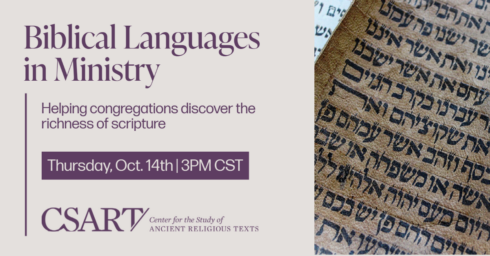
Apocrypha Demystified
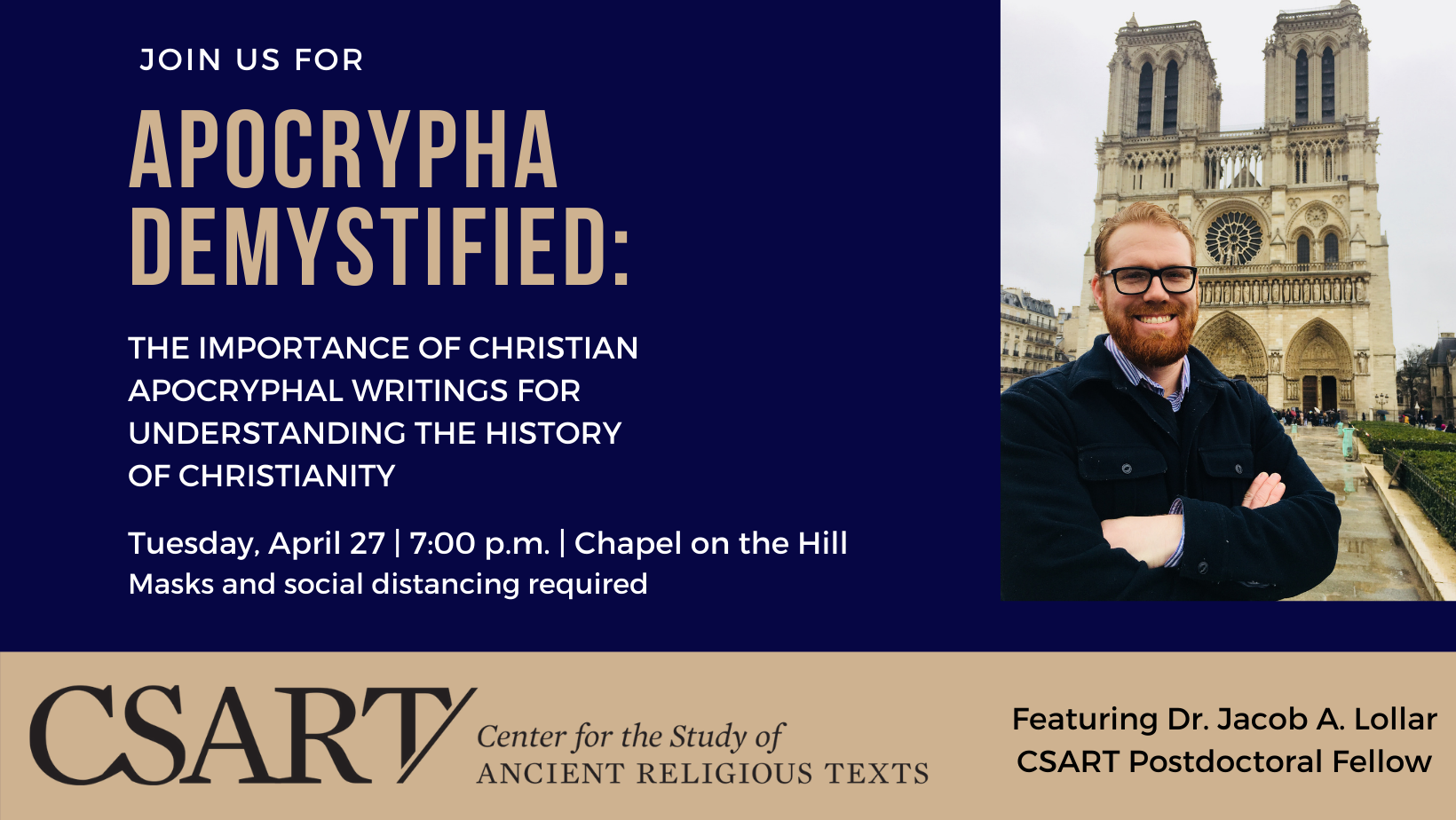
What are the apocrypha? For many people, the Christian apocrypha are mysterious and fascinating. Who wrote these texts? Where do the stories come from? What purposes did they serve? What is their value today?
If these questions interest you, we hope you’ll join us on the ACU campus for a presentation by our local expert on the Christian apocrypha, Dr. Jacob Lollar, at 7:00 pm (CDT) on Tuesday, April 27, 2021. The presentation will take place in the Chapel on the Hill, attached to the Biblical Studies Building.*
A presentation by Dr. Lollar will be followed by an opportunity to ask questions and have discussion. Reception following.
*Masks and social distancing are required on the ACU campus. For mandatory guidelines, see ACU’s COVID information pages.
For information on streaming this presentation, please contact us at csart@acu.edu.
 Jacob A. Lollar did his BA and MA at ACU before going on to complete a PhD at Florida State University. In 2017 he was awarded a Chateaubriand Fellowship in the Humanities and conducted research in Paris. Since 2018 he has been a postdoctoral fellow in ACU’s Center for the Study of Ancient Religious Texts and taught New Testament Greek in the College of Biblical Studies. He has presented and published a number of studies on Syriac Christianity and Christian Apocrypha, including a recent edition, translation, and study of The History of John the Son of Zebedee (2020).
Jacob A. Lollar did his BA and MA at ACU before going on to complete a PhD at Florida State University. In 2017 he was awarded a Chateaubriand Fellowship in the Humanities and conducted research in Paris. Since 2018 he has been a postdoctoral fellow in ACU’s Center for the Study of Ancient Religious Texts and taught New Testament Greek in the College of Biblical Studies. He has presented and published a number of studies on Syriac Christianity and Christian Apocrypha, including a recent edition, translation, and study of The History of John the Son of Zebedee (2020).
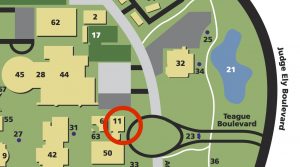
For a larger campus map, click here.
Communal Reading in the Time of Jesus
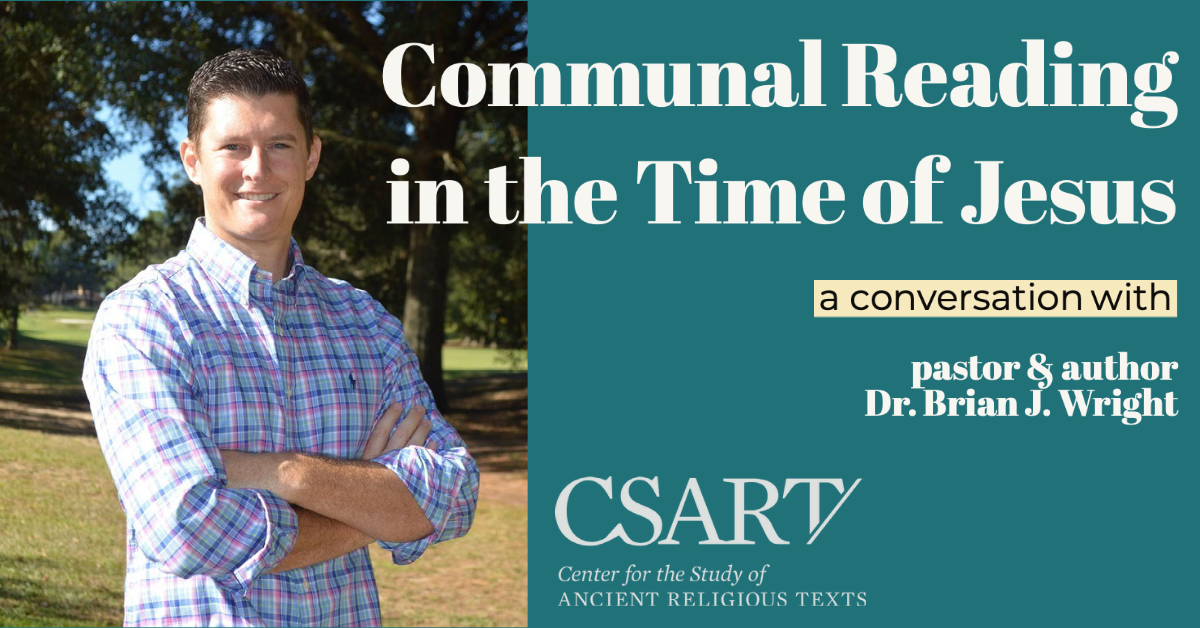
How did Jesus’ followers share his stories and teachings? Was communal reading common in the first century? Based on ancient practices of communal reading, what can we know about how scripture worked in the earliest Christian churches?
We hope you’ll join us online for a conversation with Dr. Brian J. Wright about these questions, at 5:00 pm (CDT) on Tuesday, April 6, 2021.
In his book, Communal Reading in the Time of Jesus (2017), Dr. Wright argues against commonly held views, insisting that communal reading happened in the first century and involved greater numbers of people from more diverse backgrounds than previously thought. His book raises important new questions about how the stories of Jesus were transmitted, the shape of book culture in early Christianity, the process of canonization, and how we got the text of the New Testament.
A presentation by Dr. Wright will be followed by an opportunity to ask questions and have discussion about communal reading practices that were foundational to the identity, beliefs, and character of the earliest churches.
Please CLICK HERE to register for this Zoom webinar event.
 Brian J. Wright (Ph.D., Ridley College, Melbourne) serves as an associate pastor at Denia Community Church in Denton, Texas, and has authored several books, including Communal Reading in the Time of Jesus (2017), The Rhythm of the Christian Life (2019), and Inspired Questions (2019). Both his pastoral and academic work has been featured in Christianity Today, The Gospel Coalition, Desiring God, and Power for Living.
Brian J. Wright (Ph.D., Ridley College, Melbourne) serves as an associate pastor at Denia Community Church in Denton, Texas, and has authored several books, including Communal Reading in the Time of Jesus (2017), The Rhythm of the Christian Life (2019), and Inspired Questions (2019). Both his pastoral and academic work has been featured in Christianity Today, The Gospel Coalition, Desiring God, and Power for Living.
Illustrated Bible Poems: Visual Narrative as Spiritual Practice
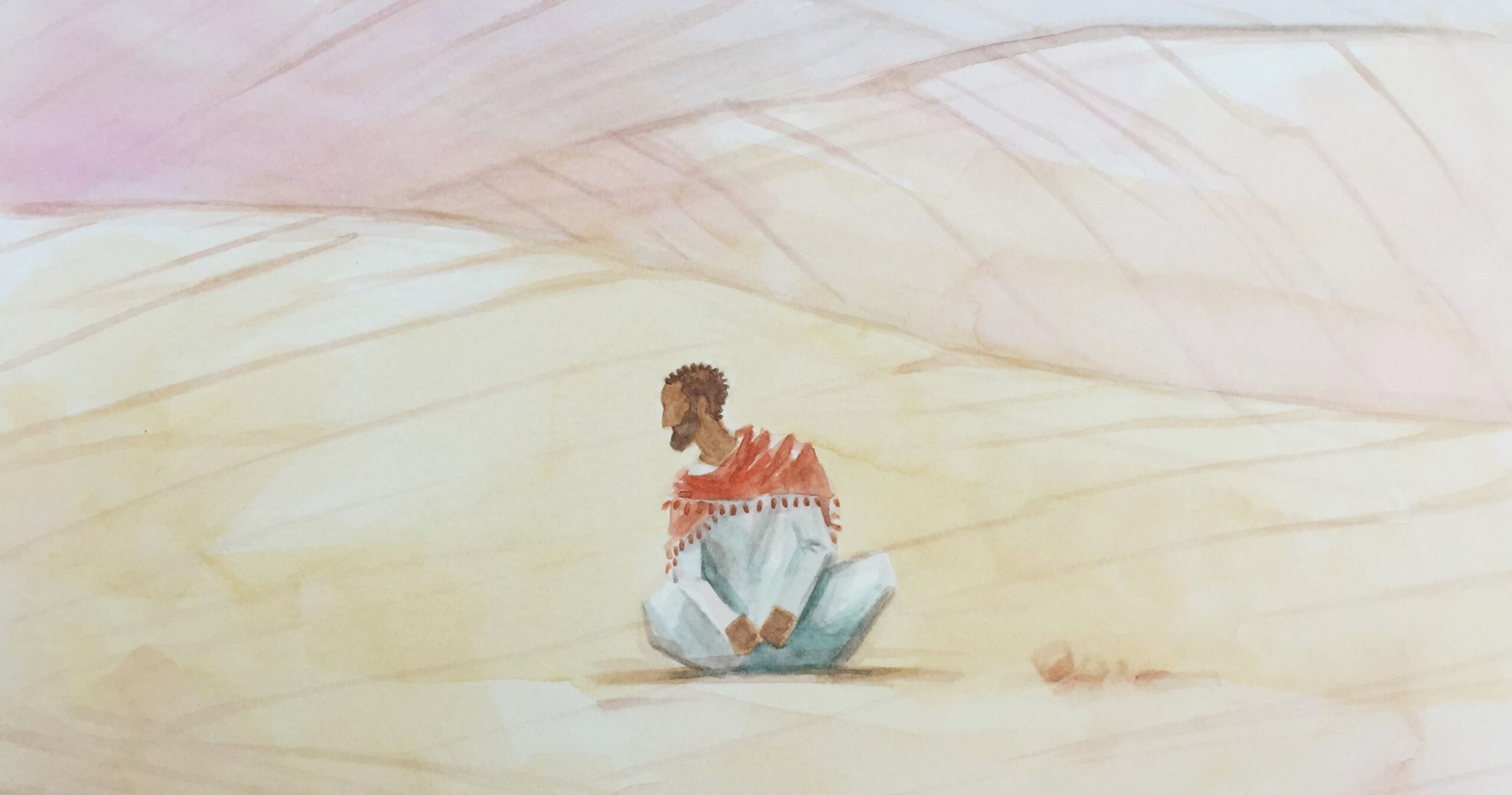
All kinds of images, from stained glass artwork and iconography to Sunday school materials, have been the constant companion of our religious texts. We’ve rightfully devoted much attention to the written text; studying its origins, transmission, translation, and application; But have we fully considered our images: their origins, transmission, and application?
Brian Dewayne presents the upcoming book ‘Illustrated Bible Poems’ and some thoughts on how our long standing practice of ‘viewing the Biblical narrative’ may have something to contribute to the conversation about American Race, American Religion, and what we’re teaching our children.
The forthcoming ‘Illustrated Bible Poems’ is a poetic children’s book that brilliantly recognizes the Afro-Asiatic context of the Biblical story, inviting us and our children into a larger visual landscape. To learn more, join us for this online presentation on Thursday, November 19 at 8:00 pm (central).
 Brian Dewayne is a visual artist from Tennessee. He says his family has been gifted with creativity for at least a few generations. His undergraduate work was in Fine Arts with a focus on painting, drawing, and sculpture. And he obtained his Masters from ACU’s Graduate School of Theology in 2012. Brian and his wife Tulisha recently celebrated ten years of marriage, and are the parents of three boys (ages: 6, 4, & 2). In addition to visual art, Brian Dewayne also enjoys writing about the intersection of Race, Religion, Riches, and the Republic of America. He has authored: ‘Kyle & Yeshua: How American Interests Hijacked the Messiah’s Religion’, ‘Teachings of the Master: Divine Wisdom for Daily Life’, as well as the up-coming book: ‘Illustrated Bible Poems.’
Brian Dewayne is a visual artist from Tennessee. He says his family has been gifted with creativity for at least a few generations. His undergraduate work was in Fine Arts with a focus on painting, drawing, and sculpture. And he obtained his Masters from ACU’s Graduate School of Theology in 2012. Brian and his wife Tulisha recently celebrated ten years of marriage, and are the parents of three boys (ages: 6, 4, & 2). In addition to visual art, Brian Dewayne also enjoys writing about the intersection of Race, Religion, Riches, and the Republic of America. He has authored: ‘Kyle & Yeshua: How American Interests Hijacked the Messiah’s Religion’, ‘Teachings of the Master: Divine Wisdom for Daily Life’, as well as the up-coming book: ‘Illustrated Bible Poems.’
Brian Dwayne’s books are available on this website: https://theblacksheeppress.wordpress.com
This presentation will occur online via Zoom. To join us for this event, contact csart@acu.edu.
Scriptures and Race
You are invited to join us for the annual Carmichael-Walling Lectures on Thursday, November 12, 2020.
We are excited to welcome Dr. Vincent L. Wimbush of the Institute for Signifying Scriptures, who will give the 2020 Lectures on the theme, Scriptures and Race.
4:00 p.m. – Mystic Hieroglyphics of the Flesh: Scripturalization as Racialization
7:15 p.m. – Even the Bible was Made to Suit our Vivid Imagination: Scripturalizing the Human
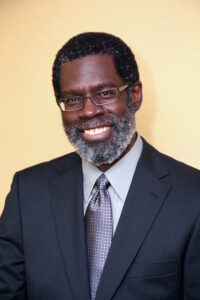 VINCENT L. WIMBUSH, Ph.D., is an internationally recognized scholar of religion, intellectual leader, and academic gadfly, with more than thirty years of advanced graduate-level teaching and research experience. He is author/editor of more than twelve books, including White Men’s Magic: Scripturalization as Slavery; MisReading America: Scriptures and Difference; Theorizing Scriptures; and African Americans and the Bible; and scores of articles and essays. He is founding director of The Institute for Signifying Scriptures (ISS), an international scholarly organization, and is conceptualizer and director of several collaborative trans-disciplinary research projects, including a documentary film (Finding God in the City of Angels) on the ethnography of scriptures. Recipient of numerous awards and research grants, he is past president of the Society of Biblical Literature.
VINCENT L. WIMBUSH, Ph.D., is an internationally recognized scholar of religion, intellectual leader, and academic gadfly, with more than thirty years of advanced graduate-level teaching and research experience. He is author/editor of more than twelve books, including White Men’s Magic: Scripturalization as Slavery; MisReading America: Scriptures and Difference; Theorizing Scriptures; and African Americans and the Bible; and scores of articles and essays. He is founding director of The Institute for Signifying Scriptures (ISS), an international scholarly organization, and is conceptualizer and director of several collaborative trans-disciplinary research projects, including a documentary film (Finding God in the City of Angels) on the ethnography of scriptures. Recipient of numerous awards and research grants, he is past president of the Society of Biblical Literature.
Wimbush’s general teaching and research interests focus on the trans-disciplinary and comparative study of “scriptures” as sharp wedge for critical research and theorizing in the politics of language, social formation, consciousness, and orientation. His particular area of expertise turns around the uses of scriptures in the historical and contemporary circum-Black Atlantic as window onto the larger comparative phenomena and dynamics of scripturalizing and scripturalization.
Models and Makers of Peace: Building Bridges in the Early Church

CSART lecture series during ACU’s Summit conference. November 5, 2020.
Christopher Hutson – Neither Jew nor Gentile: Paul’s Gospel of Ethnic Inclusion
The Hebrew Bible anticipates that in God’s glorious future all nations will turn to the God of Israel. They will not convert to Judaism but will recognize the God of Israel as the one, true God of all nations. This presentation will survey that doctrine in the Old Testament and show how it functions as a key element of Paul’s gospel. Anyone who asserts the privilege of one ethnic group over other ethnic groups is violating “the truth of the gospel.”
John Boyles – Money, Money, Money: Rich and Poor Worlds in the New Testament
“The poor you will always have with you” has proven to be a deeply true saying from Jesus. Recent years have highlighted divides in our society between the so-called “rural poor” and “urban elite” that motivate political and cultural divides. Even further, the economic consequences of the coronavirus pandemic have raised profound questions about money, threatening to divide communities further. What were the socio-economic divides in the ancient church? How did early Christians build bridges across those divides?
Kathy Pulley – Males and Females as One in Christ: dream, Delusion, or Nightmare?
Why was the Apostle Paul interested in being a bridge-builder in his first-century context, specifically between men and women? Do his reasons have validity and significance in our own churches’ battles for the mutual embracing of men and women?
Presenters and Pathway Guide
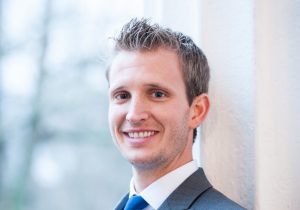 John Boyles — Presenter. John Boyles is an assistant professor in the Department of Bible, Missions, and Ministry and a member of the Highland Church of Christ. His current research focuses on the social history of the ancient Mediterranean as it can inform the study of the New Testament, especially the lived experience in groups and associations. He teaches courses in biblical interpretation and biblical languages. He and his wife, Lauren, live in Abilene.
John Boyles — Presenter. John Boyles is an assistant professor in the Department of Bible, Missions, and Ministry and a member of the Highland Church of Christ. His current research focuses on the social history of the ancient Mediterranean as it can inform the study of the New Testament, especially the lived experience in groups and associations. He teaches courses in biblical interpretation and biblical languages. He and his wife, Lauren, live in Abilene.
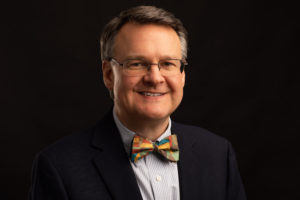 Christopher Hutson — Presenter. Christopher Hutson is professor of Bible, missions, and ministry at ACU, where he has taught since 2010. His primary research area is the New Testament, especially the Pauline letters and Luke-Acts. He also studies the Stone-Campbell movement, race relations in America, and the application of biblical texts to contemporary social issues. He is interested in Jewish-Christian relations and is an associate member of Temple Mizpah in Abilene.
Christopher Hutson — Presenter. Christopher Hutson is professor of Bible, missions, and ministry at ACU, where he has taught since 2010. His primary research area is the New Testament, especially the Pauline letters and Luke-Acts. He also studies the Stone-Campbell movement, race relations in America, and the application of biblical texts to contemporary social issues. He is interested in Jewish-Christian relations and is an associate member of Temple Mizpah in Abilene.
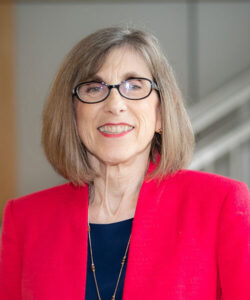 Kathy Pulley — Presenter. Kathy Pulley teaches in the Religious Studies Department at Missouri State University and is a member of the East Sunshine Church of Christ in Springfield, Missouri. Her teaching schedule includes courses in religion and politics, women, religion, and violence, and modern religious thought. A primary focus area of her work has been the socio-historical and theological dimensions of conservative Protestant institutions and women. She is pleased to have contributed a chapter on civil rights and the religious right in Slavery’s Long Shadow: Race and Reconciliation in American Christianity.
Kathy Pulley — Presenter. Kathy Pulley teaches in the Religious Studies Department at Missouri State University and is a member of the East Sunshine Church of Christ in Springfield, Missouri. Her teaching schedule includes courses in religion and politics, women, religion, and violence, and modern religious thought. A primary focus area of her work has been the socio-historical and theological dimensions of conservative Protestant institutions and women. She is pleased to have contributed a chapter on civil rights and the religious right in Slavery’s Long Shadow: Race and Reconciliation in American Christianity.
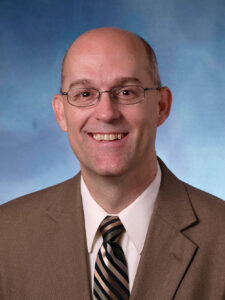 Curt Niccum — Pathway Guide. Curt Niccum is professor of Bible at ACU where he also serves as CSART’s assistant director. He preaches at the South 11th & Willis Church of Christ. He is co-editor for the Novum Testamentum Graecum Editio Critica Maior (ECM) Colossians Project; a collaborator with the ECM Mark, John, Pastoral Epistles, and Revelation Projects; and a member of the International Greek New Testament Project Committee.
Curt Niccum — Pathway Guide. Curt Niccum is professor of Bible at ACU where he also serves as CSART’s assistant director. He preaches at the South 11th & Willis Church of Christ. He is co-editor for the Novum Testamentum Graecum Editio Critica Maior (ECM) Colossians Project; a collaborator with the ECM Mark, John, Pastoral Epistles, and Revelation Projects; and a member of the International Greek New Testament Project Committee.
Being a Slave in the New Testament
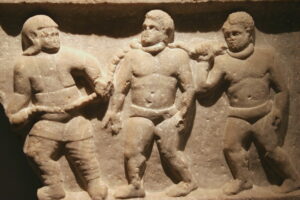
Collared slaves (marble relief, Smyrna, ca.200 CE; courtesy Ashmolean Museum, Oxford)
In the period of the New Testament, slavery was not just a poetic metaphor—it was a social reality. What are we supposed to make of the mentions of slavery in the New Testament?
In the modern Americas, both pro-slavery and anti-slavery forces appealed to the Bible for support. Why aren’t the New Testament authors more critical of slavery? An exploration of slavery in the ancient Roman Empire and key mentions of slavery in the New Testament may provide us with some perspective on these difficult questions.
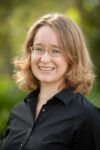 To learn more, join us on Thursday, October 22 at 3:30 pm (central), for a conversation with Caryn A. Reeder. Dr. Reeder is professor of New Testament at Westmont College (Santa Barbara). Her research focuses on the social world of the New Testament. Her publications include, The Enemy in the Household: Family Violence in Deuteronomy and Beyond (Baker Academic, 2012), Gendering War and Peace in the Gospel of Luke (Cambridge, 2018), and Slavery in the New Testament (GroveBiblical, 2019).
To learn more, join us on Thursday, October 22 at 3:30 pm (central), for a conversation with Caryn A. Reeder. Dr. Reeder is professor of New Testament at Westmont College (Santa Barbara). Her research focuses on the social world of the New Testament. Her publications include, The Enemy in the Household: Family Violence in Deuteronomy and Beyond (Baker Academic, 2012), Gendering War and Peace in the Gospel of Luke (Cambridge, 2018), and Slavery in the New Testament (GroveBiblical, 2019).
This presentation will occur online via Zoom. To join us for this event, contact csart@acu.edu.
Greco-Roman Inscriptions
 The place of women in early Christianity? Leadership structures in the Christian churches? The meanings of vague Greek words used in the New Testament? The Mark of the Beast?
The place of women in early Christianity? Leadership structures in the Christian churches? The meanings of vague Greek words used in the New Testament? The Mark of the Beast?
The study of ancient inscriptions enriches our understanding of the culture in which early Christians lived and wrote and can help us solve certain problems interpreting the New Testament.
To learn more, join us on Friday, October 9 at 2:00 pm (central), for a conversation with D. Clint Burnett, author of Studying the New Testament through Inscriptions (Hendrickson 2020). Dr. Burnett is Lecturer of New Testament at Johnson University.
This presentation will occur online via Zoom. To join us for this event, contact csart@acu.edu.
Hearing Philippians: A Performance Criticism Exploration of a New Testament Letter
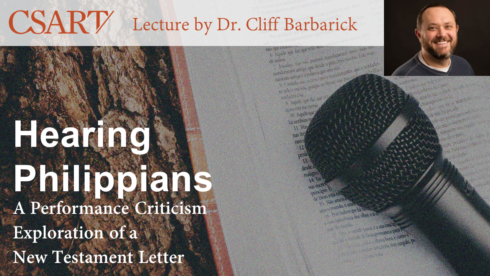 Due to measures being taken on the campus of Abilene Christian University to minimize the spread of COVID-19, our CSART Lecture scheduled for March 24 has been postponed, date to be determined.
Due to measures being taken on the campus of Abilene Christian University to minimize the spread of COVID-19, our CSART Lecture scheduled for March 24 has been postponed, date to be determined.
Join us for a special presentation hosted by ACU’s Center for the Study of Ancient Religious Texts (CSART), at Abilene Christian University on Tuesday 24 March 2020 at 7:30 p.m. on the ACU campus.
What we call the New Testament consists of books that were written, primarily, to be heard (rather than read silently). As a result, hearing them told aloud often provides new insights into these early Christian compositions. This lecture featuring Dr. Cliff Barbarick will provide a fresh experience of scripture as literature meant to be heard aloud, not merely read.
After outlining the oral process for composing and sharing letters in the ancient world, Dr. Barbarick will perform Paul’s letter to the Philippians, and then explore how this experience might shape our understanding of the letter
This event is free, open to the public, and will take place in room 114 of the Biblical Studies Building on ACU’s campus. For more information, contact csart@acu.edu.
We hope you will join us for this special evening!
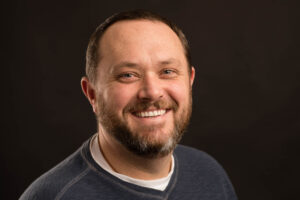 Dr. Cliff Barbarick is an Associate Professor in the Department of Bible, Missions, and Ministry at ACU as well as the Director of Faculty Development in the Adams Center for Teaching and Learning. Dr. Barbarick has lived in Abilene since 2011 with his wife and three school-aged children. His passion for biblical performance criticism results from its capacity as a powerful pedagogical tool in the classroom, an encouraging ministry in the church, and a transformative spiritual discipline in his own life.
Dr. Cliff Barbarick is an Associate Professor in the Department of Bible, Missions, and Ministry at ACU as well as the Director of Faculty Development in the Adams Center for Teaching and Learning. Dr. Barbarick has lived in Abilene since 2011 with his wife and three school-aged children. His passion for biblical performance criticism results from its capacity as a powerful pedagogical tool in the classroom, an encouraging ministry in the church, and a transformative spiritual discipline in his own life.

For a larger campus map, click here.
Spirits of Love, Temperance, and Timidity: Spiritual Warfare in the Pastoral Epistles
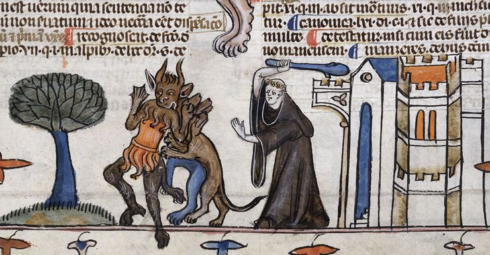
London, British Library Royal 10 E IV (f.247r, detail)
Join us for a special presentation, discussion, and reception hosted by ACU’s Center for the Study of Ancient Religious Texts (CSART), at Abilene Christian University on Tuesday, February 4, 2020 at 7:30 p.m. on the ACU campus.
We are honored to showcase the commentary recently published by CSART Fellow, Dr. Christopher Hutson: First and Second Timothy and Titus, in the Paideia series (BakerAcademic 2019). Dr. Hutson will lecture on 2 Timothy 1, focusing on the “spirit of timidity” and the spirits of “power and love and temperance.” This well-known passage has featured in historic discussions about spiritual warfare. Dr. Hutson will set the passage in its ancient rhetorical context, helping us to acquire traditional Christian vocabulary about spiritual warfare and to think more robustly about the Holy Spirit in the life of the Church today.
A reception will follow.
This event is free, open to the public, and will take place in the Packer Forum of the Brown Library on ACU’s campus. For more information, contact csart@acu.edu.
We hope you will join us for this special evening!
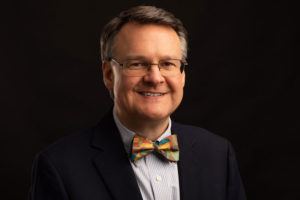 Christopher R. Hutson (PhD, Yale University) is professor of Bible, missions, and ministry and is associate dean for academic programs and services in the College of Biblical Studies at Abilene Christian University. He previously taught at Hood Theological Seminary and St. Xavier University. He is also the author of 1 Corinthians: A Community Not of This Age.
Christopher R. Hutson (PhD, Yale University) is professor of Bible, missions, and ministry and is associate dean for academic programs and services in the College of Biblical Studies at Abilene Christian University. He previously taught at Hood Theological Seminary and St. Xavier University. He is also the author of 1 Corinthians: A Community Not of This Age.

For a larger campus map, click here.
Carmichael-Walling Lectures 2019
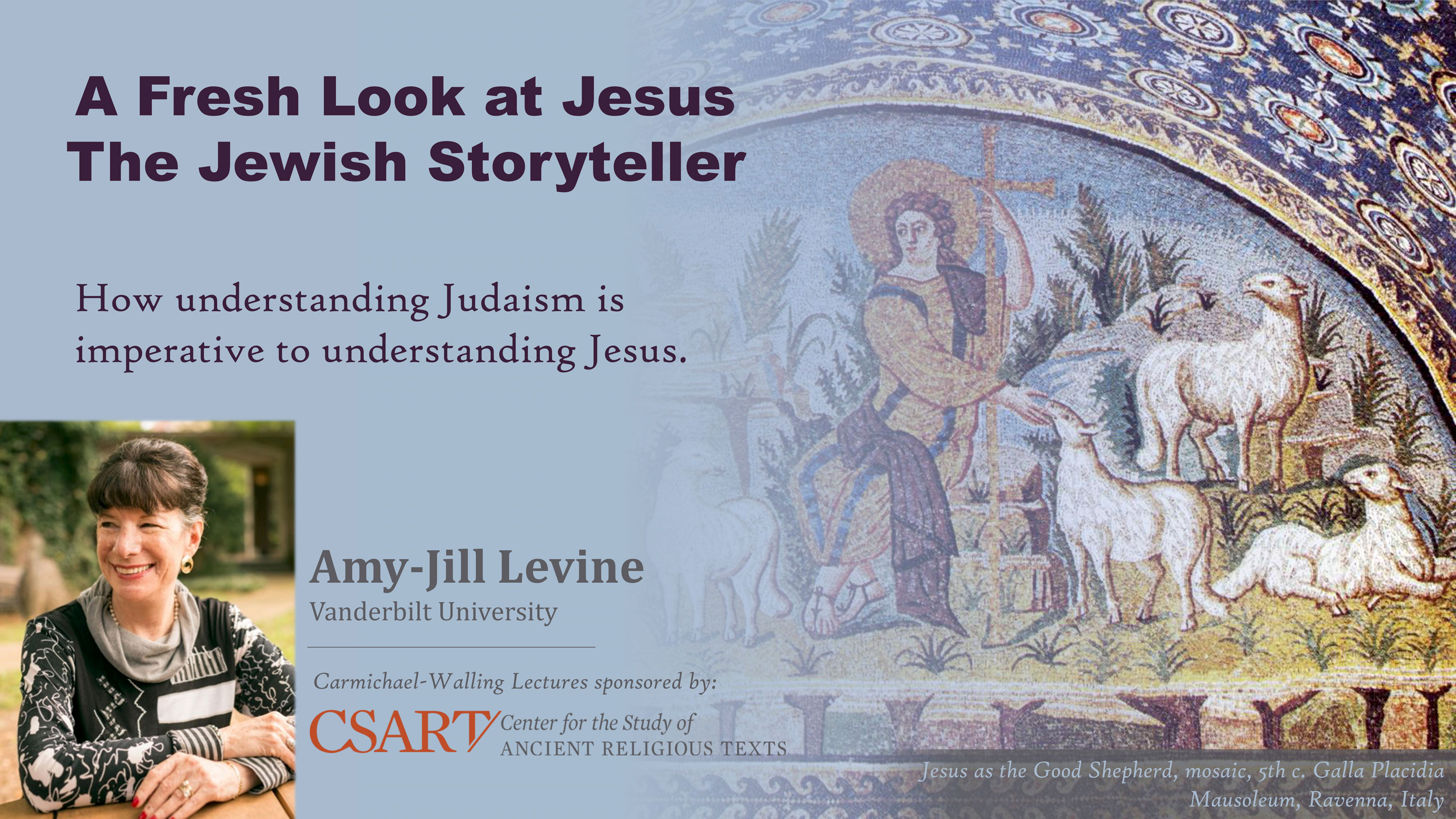
You are invited to join us for the annual Carmichael-Walling Lectures at Abilene Christian University on Thursday, November 14.
Dr. Amy-Jill Levine of Vanderbilt University will give the Lectures on the theme: A Fresh Look at Jesus the Storyteller.
4:00 p.m. – Understanding Jesus Means Understanding Judaism: a Workshop
7:15 p.m. – Hearing the Parables through Jewish Ears: Sheep, Coins, Prodigals, and Samaritans
Jesus and his first followers were Jews, thoroughly grounded in Jewish Scripture, Jewish ethics and theology, and Jewish hopes. To understand the New Testament is thus to recover Jewish history. Yet ignorance of this history sometimes leads to New Testament readings that create or reinforce anti-Jewish views. How might understanding the New Testament in its historical context provide a better understanding of Jesus and Paul, correct misinformed teaching and preaching, and offer a productive approach to Jewish-Christian relations?
Lectures are free, open to the public and will take place in the Onstead-Packer Biblical Studies Building in Room 114 on ACU’s campus in Abilene, Texas. For more information, contact csart@acu.edu.

For a larger campus map, click here.
We hope you will join us for this insightful evening!
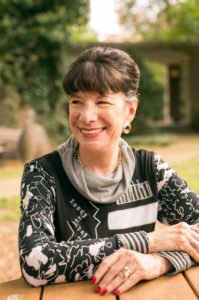 Amy-Jill Levine is University Professor of New Testament and Jewish Studies and Mary Jane Werthan Professor of Jewish Studies at Vanderbilt Divinity School and College of Arts and Science; she is also Affiliated Professor, Woolf Institute, Centre for the Study of Jewish-Christian Relations, Cambridge UK. Her books include The Misunderstood Jew: The Church and the Scandal of the Jewish Jesus;The New Testament, Methods and Meanings (with Warren Carter), and Short Stories by Jesus: The Enigmatic Parables of a Controversial Rabbi. With Sandy Eisenberg Sasso, she co-authored three children’s books on Jesus’ parables. With Marc Z. Brettler, she co-edited the Jewish Annotated New Testament. Her most recent book is a commentary on The Gospel of Luke, co-authored with Ben Witherington. Holding the B.A. from Smith College, the M.A. and Ph.D. from Duke University, and five honorary doctorates, she is the first Jew to teach a New Testament course at the Pontifical Biblical Institute in Rome.
Amy-Jill Levine is University Professor of New Testament and Jewish Studies and Mary Jane Werthan Professor of Jewish Studies at Vanderbilt Divinity School and College of Arts and Science; she is also Affiliated Professor, Woolf Institute, Centre for the Study of Jewish-Christian Relations, Cambridge UK. Her books include The Misunderstood Jew: The Church and the Scandal of the Jewish Jesus;The New Testament, Methods and Meanings (with Warren Carter), and Short Stories by Jesus: The Enigmatic Parables of a Controversial Rabbi. With Sandy Eisenberg Sasso, she co-authored three children’s books on Jesus’ parables. With Marc Z. Brettler, she co-edited the Jewish Annotated New Testament. Her most recent book is a commentary on The Gospel of Luke, co-authored with Ben Witherington. Holding the B.A. from Smith College, the M.A. and Ph.D. from Duke University, and five honorary doctorates, she is the first Jew to teach a New Testament course at the Pontifical Biblical Institute in Rome.
Ethics in Contexts
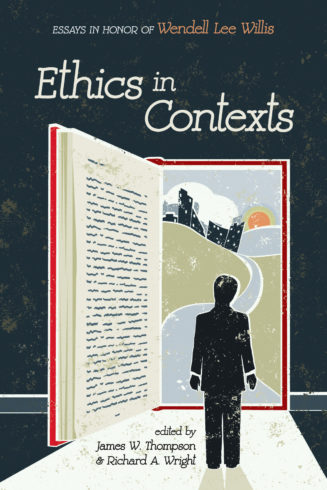 Join us for a special presentation, discussion, and reception hosted by ACU’s Center for the Study of Ancient Religious Texts (CSART), at Abilene Christian University on Tuesday, September 17 at 8:15 p.m. in the Chapel on the Hill, on the ACU campus.
Join us for a special presentation, discussion, and reception hosted by ACU’s Center for the Study of Ancient Religious Texts (CSART), at Abilene Christian University on Tuesday, September 17 at 8:15 p.m. in the Chapel on the Hill, on the ACU campus.
We are honored to showcase the book recently published to celebrate the distinguished career of CSART Fellow, Dr. Wendell WIllis, long-time Bible teacher in ACU’s College of Biblical Studies: Ethics in Contexts: Essays in Honor of Wendell Lee Willis (Wipf & Stock 2019).
Jacob Lollar, one of Dr. Willis’ former students, will be our host. Book editors and contributors James W. Thompson and Richard W. Wright will tell us about Wendell’s career and explain the vital topic of New Testament Ethics, after which Dr. Willis will have an opportunity to respond.
A reception will follow, in the Rotunda adjoining the Chapel.
This event is free, open to the public, and will take place in the Chapel on the Hill in the Onstead-Packer Biblical Studies Building on ACU’s campus. For more information, contact csart@acu.edu.
We hope you will join us for this celebration!
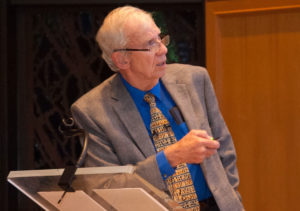

For a larger campus map, click here.
The Psalms in the Church's Worship
 CSART lecture series during the Summit conference. Sept. 17, 2019. Abilene Christian University Campus, College of Biblical Studies, room 114.
CSART lecture series during the Summit conference. Sept. 17, 2019. Abilene Christian University Campus, College of Biblical Studies, room 114.
Join us for a series of reflections on the Psalms by a panel of specialists on interpreting and performing the Psalms. The sessions are open to the public and free of charge.
The book of Psalms has provided rich resources for Jewish and Christian worship and ethical reflection for centuries. It still does. The speakers on this panel draw on years of work as scholars and artists to explore the book’s many dimensions as a source for study, prayer, song, and art. As the church’s first song book, Psalms provides language and images for lament and praise, storytelling and the pursuit of wisdom. In short, it helps us be more fully human in our lives before God.
September 17, 2019
8:30 – 9:15am Nancy L. deClaissé-Walford – Bringing in the Sheaves with Shouts of Joy: Embodied Worship in the Songs of Ascents
The Psalms are a rich source of information about the worship experiences of our ancestors in the faith. By studying the bodily movements of worshippers in the Songs of Ascents, we can learn more about bringing our whole selves to the worship experience. Nancy L. deClaissé-Walford is the Carolyn Ward Professor of Old Testament and Biblical Languages at the McAfee School of Theology at Mercer University in Atlanta, Georgia.
9:30 – 10:15am R. Mark Shipp – Singing the Lord’s Song: Psalm-Singing through the Ages
This session will contain an overview of Psalm-singing through the ages (with audience participation!), and an introduction to Timeless: Ancient Psalms for the Church Today Psalter/Commentary, edited by Mark Shipp himself. R. Mark Shipp is the Pat E. Harrell Professor of Old Testament at Austin Graduate School of Theology, Austin, Texas.
1:30 – 2:15pm Jason Byassee – Christ Prays the Psalms, They Pray Him Back: In Defense of Christological Reading of the Old Testament
The church long read the Psalms christologically. Is there a way, after historical criticism, to learn from these ways of reading anew? More daringly now, is there a way to practice them while avoiding anti-Judaism and historical anachronism? Jason Byassee is the inaugural holder of the Butler Chair in Homiletics and Biblical Hermeneutics at Vancouver School of Theology, where he teaches preaching, Bible, leadership, church history, and writing.
2:30 – 3:15pm Nancy L. deClaissé-Walford – On the Willows We Hung Up Our Harps: Preaching the Imprecatory Psalms
The imprecatory words in the Psalter are demands for violence in response to violence, making them difficult to incorporate into our worship experiences. We will explore why these words are a vital part of our relationship with God and others.
3:30 – 4:15pm Mark Hamilton – Reflections on the Psalms in the Church’s Worship
A panel discussion with all available participants, moderated by Glenn Pemberton and Mark Hamilton. Mark Hamilton teaches courses in biblical Hebrew and Old Testament at ACU. Glenn Pemberton is a minister turned professor turned writer. He taught at Oklahoma Christian University before coming to Abilene Christian University.
Room 114, College of Biblical Studies,
Abilene Christian University
For a larger campus map, click here.
Fluid Roles and Regulations
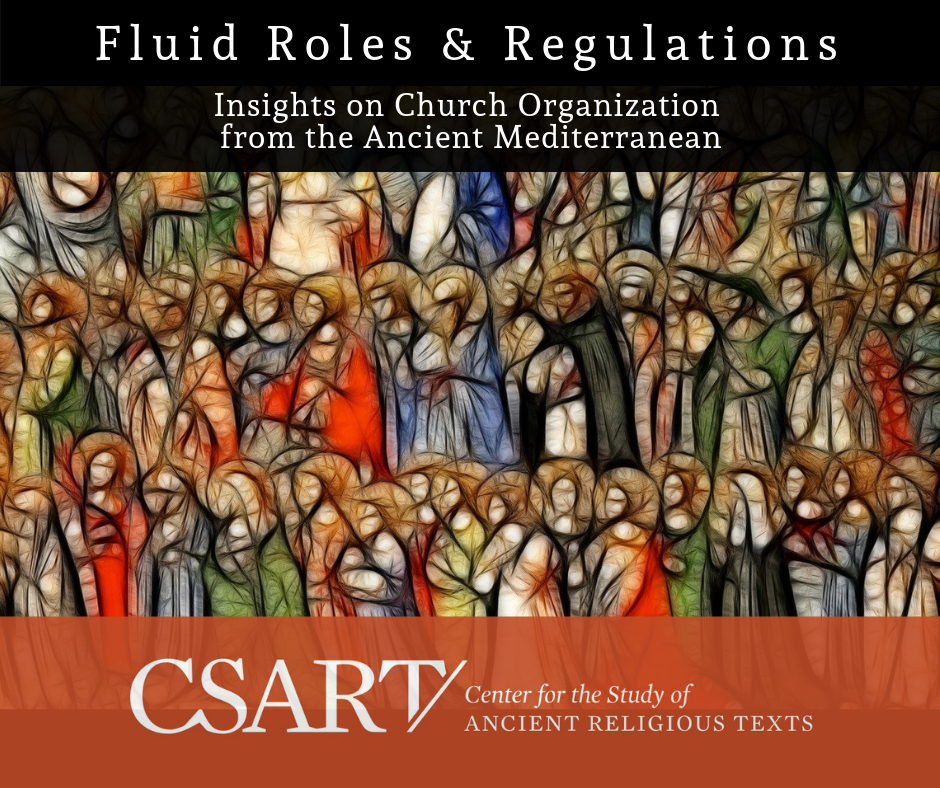
Join us for a public lecture presented by ACU’s Center for the Study of Ancient Religious Texts, at Abilene Christian University on Tuesday, February 19 at 7:30 pm.
Dr. John Boyles of ACU’s College of Biblical Studies will give the lecture, titled: Fluid Roles and Regulations: Insights on Church Organization from the Ancient Mediterranean
Church leadership has always been complicated. Although we often think of the ancient gatherings of Christians as developing from one fixed stage of organization to the next, the whole of the ancient evidence portrays a much more flexible and fluid organization. Dr. Boyles, who researches the social aspects of ancient Mediterranean society, will explore what implications this may have for the church today.
This lecture is free, open to the public and will take place in the Onstead-Packer Biblical Studies Building in room 130 on ACU’s campus. For more information, contact csart@acu.edu.

For a larger campus map, click here.
We hope you will join us for this insightful evening!
 Dr. John Boyles is Assistant Professor of New Testament in the Department of Bible, Missions, and Ministry at Abilene Christian University. His research interests include the reception history of the Bible and the social history of the ancient Mediterranean as it can inform the study of the New Testament, especially the lived experience in groups and associations. He teaches courses in biblical interpretation and biblical languages. Dr. Boyles and his wife, Lauren, came to Abilene in 2016 and are members of Highland Church of Christ.
Dr. John Boyles is Assistant Professor of New Testament in the Department of Bible, Missions, and Ministry at Abilene Christian University. His research interests include the reception history of the Bible and the social history of the ancient Mediterranean as it can inform the study of the New Testament, especially the lived experience in groups and associations. He teaches courses in biblical interpretation and biblical languages. Dr. Boyles and his wife, Lauren, came to Abilene in 2016 and are members of Highland Church of Christ.
Jesus King of Strangers

Join us for a special presentation and panel discussion presented by ACU’s Center for the Study of Ancient Religious Texts, at Abilene Christian University on Thursday, March 21 at 7 p.m.
Dr. Mark Hamilton of ACU’s College of Biblical Studies will give a presentation on his book: Jesus, King of Strangers: What the Bible Really Says about Immigration (Eerdmans 2019).
A panel discussion on the topic will follow, featuring Elizabeth Alvarez Bingham (General Counsel, Dallas County Republican Party), Domitien Nbizi (Outreach Minister, 11th and Willis Church of Christ, Abilene; translator, Abilene International Rescue Committee), Derran Reese (Abilene International Rescue Committee), and Myles Werntz (Professor of Ethics, Hardin Simmons University).
Hamilton’s book strikes a timely note:
“Nationalistic tribalism is on the rise around the world. How we treat strangers (foreigners, immigrants, migrants) is a prominent political, economic, and religious issue. Drawing on his personal experiences and expertise as a biblical scholar, Mark Hamilton argues that Scripture describes God’s people as strangers who are called to show grace and hospitality to others.
The church has often identified itself as a community of strangers. This was the story of the church during much of its early history. In many parts of the world, it still is. In a world in which 240 million persons are voluntary immigrants and another 60 to 70 million are refugees, the urgency of the church’s recovery of its native language on immigration remains vital. Jesus, King of Strangers examines the Bible’s key ideas about human movement and the relationship between migrants and their hosts. Hamilton argues that reclaiming the biblical language will free the church from hypernationalism and fear-driven demagoguery.” (Source: eerdmans.com)
This event is free, open to the public, and will take place in the Chapel on the Hill in the Onstead-Packer Biblical Studies Building on ACU’s campus. For more information, contact csart@acu.edu.

For a larger campus map, click here.
We hope you will join us for this insightful evening!
Carmichael-Walling Lectures 2018
You are invited to join us for the annual Carmichael-Walling Lectures at Abilene Christian University on Thursday, November 8.
Dr. John Fitzgerald of the University of Notre Dame will give the Lectures on the theme: Friends and Drunks: Two Glimpses into the Social History of the Early Christians and Their World.
4:00 p.m. – The Testament of Jesus: Wills, Friends, and the Fourth Gospel
Last wills and testaments in the ancient Mediterranean world often involved the testator’s friends, with friends made heirs, given legacies, assigned certain tasks, and asked to play other roles in the testation process. In this lecture attention will be given to the making of wills in antiquity, the roles played by friends of the testator, and some aspects of the Gospel of John that are illumined by this intersection of testation and friendship.
7:30 p.m. – Wine and the Problem of Intoxication in the World of Early Christianity
Heavy drinking and intoxication were common phenomena in the Greco-Roman world, and as the New Testament and other early Christian literature attest, early Christians were not immune from these problems. This lecture will give attention to the consumption of wine in the ancient Mediterranean world, the problem of intoxication, and the awareness of this problem by early Christian authors.
Lectures are free, open to the public and will take place in the Onstead-Packer Biblical Studies Building in Room 114 on ACU’s campus in Abilene, Texas. For more information, contact csart@acu.edu.

For a larger campus map, click here.
We hope you will join us for this insightful evening!
 John Fitzgerald (ACU 1970) is Professor of Biblical Studies/Christianity and Judaism in Antiquity in the Department of Theology at the University of Notre Dame. He is a master teacher and has published many articles and books, focusing on the cultural contexts of early Christianity. Among the areas Fitzgerald is currently researching are the role of friendship in the spread of early Christianity, the economy—including issues such as the attitude of the church and the government regarding unemployment—and domestic violence in antiquity.
John Fitzgerald (ACU 1970) is Professor of Biblical Studies/Christianity and Judaism in Antiquity in the Department of Theology at the University of Notre Dame. He is a master teacher and has published many articles and books, focusing on the cultural contexts of early Christianity. Among the areas Fitzgerald is currently researching are the role of friendship in the spread of early Christianity, the economy—including issues such as the attitude of the church and the government regarding unemployment—and domestic violence in antiquity.
The Word in a Broken World
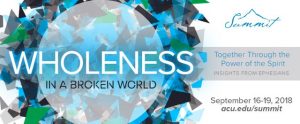 CSART lecture series during the Summit conference. Sept. 17, 2018. Abilene Christian University Campus, College of Biblical Studies, room 120.
CSART lecture series during the Summit conference. Sept. 17, 2018. Abilene Christian University Campus, College of Biblical Studies, room 120.
The world is broken, but it has been for some time. Over the centuries Christians have responded to this brokenness in a variety of ways: reinterpreting, redirecting, re-envisioning, and reproducing the Word. In this series of lectures by exceptional biblical scholars, perhaps we might learn from the past both how to address and perhaps to heal this brokenness. We hope you will join us for this series of presentations. They are open to the public and free of charge.
September 17, 2018
9:00 – 9:45am Glenn Pemberton — Spare the Rod and Spoil the Proverb: Reading Israel’s Wisdom in a World Lacking Wisdom
This session attempts to unpack the inner-workings of the simple two-line proverb in an effort to train up readers in the way they should go. Blessed is the person who doesn’t have a dog that returns to its vomit. And like the one who digs a pit, a little sleep and a little slumber can break bones.
10:00 – 10:45am Curt Niccum — “What Is That Thing?” How We Got the New Testament
Do you hate when scripture is projected on screens? Does the reading of the Bible from handheld devices in church annoy you? Come see how early Christianity embraced new technologies that shaped their communities and changed the world
1:30 – 2:15pm John H. Boyles — Fluid Roles and Regulations: Insights on Church Organization from the Ancient Mediterranean
Church leadership has always been complicated. Although we often think of the ancient gatherings of Christians as developing from one fixed stage of organization to the next, the evidence from the broad, ancient Mediterranean world portrays a much more flexible and fluid organization. What might that suggest for today?
2:30 – 3:15pm Kelli Gibson — Guidance and Light: Christian Scriptures in Early Islam
Christianity and Islam, both tracing their roots to a common past, have been in conflict for centuries. Explore the shared and contested scriptural heritage of early Islam and Christianity as it appears in the Qur’an, apologetic writings and legendary stories.
3:30 – 4:15pm Frederick D. Aquino — Cutting through the Noise: Truth and Discernment in the 21st Century
We feel overwhelmed by the noise of social media, news outlets, and the relentless stream of facts and opinion. This session will show how the thought of Christian monk and theologian John Cassian can help us sort through the many conflicting messages we encounter in public conversation today.
Room 120, College of Biblical Studies,
Abilene Christian University
For a larger campus map, click here.
The Reign of God in Daniel
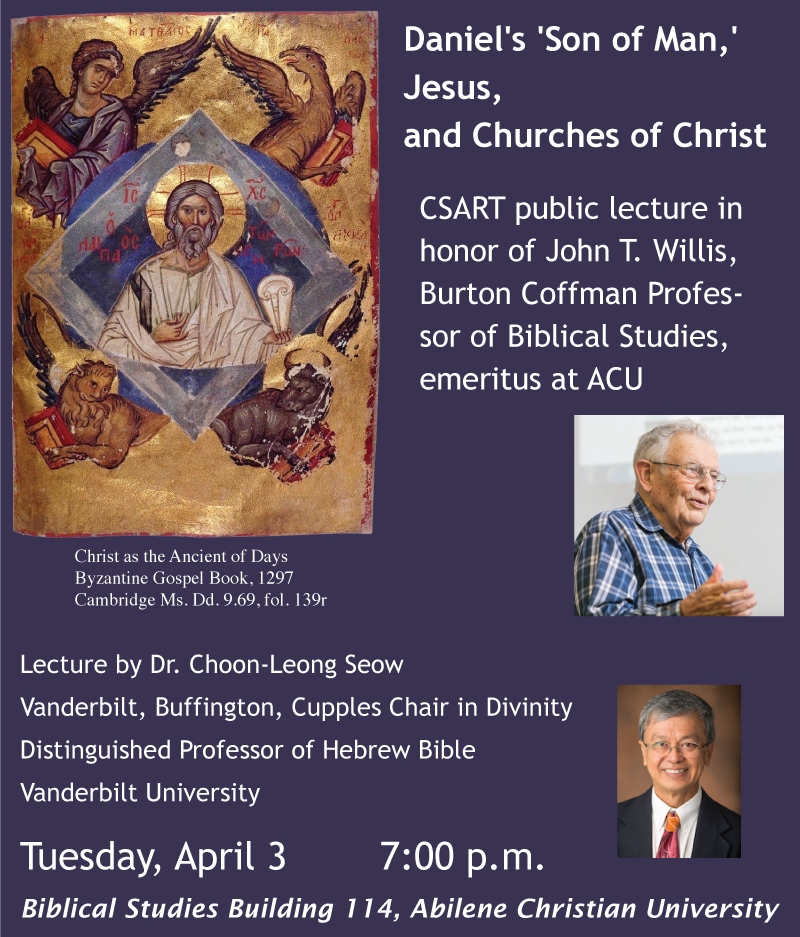
The lecture is free and open to the public. We hope you will join us for this delightful and informative evening.
April 3, 2018
7:00 p.m.
Room 114, College of Biblical Studies,
Abilene Christian University
For a larger campus map, click here.
Cutting through the Noise: Truth and Discernment in the 21st Century
As our “knowledge” doubles in size every few months and we are constantly inundated with the noise of social media, news outlets, and the relentless stream of facts and opinion, many feel overwhelmed. What is true? Which facts matter? What can we trust—and how do we learn to trust it? These may be questions of wisdom more than data, discerning more than liking, seasoned practice more than quick judgment.
You are invited to join us for a public lecture by Dr. Fred Aquino, professor of theology and a recognized specialist in the study of knowledge. Keenly aware of the unique challenges of the 21st century, Dr. Aquino finds the teachings and practices of ancient Christian monastics provide surprising help for those of us today who find ourselves bewildered by the competing truth claims all around us.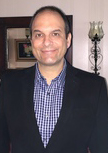
The lecture is free and open to the public. We hope you will join us for this delightful and informative evening.
March 6, 2018
7:30 p.m.
Room 114, College of Biblical Studies,
Abilene Christian University
For a larger campus map, click here.
Contact, Conversation & Conversion: The Early Centuries of Muslim-Christian Relations
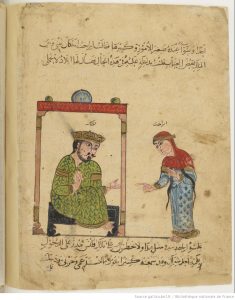
BnF ms. Arabe 3465, f. 130v
Questions out of the past…
Who are the Muslims? What do they believe? How do Muslims differ from Christians? Do the two have anything in common? Why are relationships so tense and what does the future hold? These questions seem very contemporary, but they were being asked long before the 21st century.
You are invited to join us for a public Lecture by Dr. Kelli Gibson, CSART fellow and assistant professor of historical theology in the College of Biblical Studies at ACU. Dr. Gibson is an expert on Christianity in the Middle East during the origins and early history of Islam. Her lecture takes us back to those early centuries so that we can better understand the current situation in light of the past.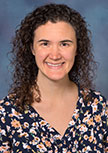
The lecture is free and open to the public. We hope you will join us for this delightful and informative evening.
February 6, 2018
7:30 p.m.
Room 114, College of Biblical Studies,
Abilene Christian University
For a larger campus map, click here.
Carmichael-Walling Lectures 2017

You are invited to join us for the annual Carmichael-Walling Lectures at Abilene Christian University on November 9.
Dr. Mark Goodacre of Duke University will give the Lectures on the theme: Transforming Gospels: Exploring John’s Relationship to the Other Three. An expert on the New Testament Gospels, Dr. Goodacre will speak on the complex and controversial question of the relationship between the Gospel of John and the Synoptic Gospels. He will explore John’s knowledge of the Synoptics as revealed in the way the Evangelist casts their narratives in the dramatic mode. Also, he will address surprising and typically understated similarities in the Christology of the Synoptics and John.
- 4 p.m. – John’s Dramatic Transformation of the Synoptics
- 7 p.m. – John’s Christological Transformation of the Synoptics
Lectures are free, open to the public and will take place in the Onstead-Packer Biblical Studies Building in Room 114 on ACU’s campus. For more information, contact csart@acu.edu.

For a larger campus map, click here.
We hope you will join us for this insightful evening as we delve into the Gospels together and explore the links between them.
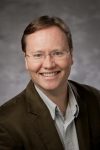 Mark Goodacre is Professor of New Testament & Christian Origins in the Department of Religious Studies at Duke University. He has published many articles. His books include, The Case Against Q: Studies in Marcan Priority and the Synoptic Problem (2002), and Thomas and the Gospels: The Case for Thomas’s Familiarity with the Synoptics (2012). Mark edits New Testament Gateway, one of the longest-lived websites devoted to New Testament Studies, and is a lively participant in online conversation about the connections between academic biblical studies and contemporary culture.
Mark Goodacre is Professor of New Testament & Christian Origins in the Department of Religious Studies at Duke University. He has published many articles. His books include, The Case Against Q: Studies in Marcan Priority and the Synoptic Problem (2002), and Thomas and the Gospels: The Case for Thomas’s Familiarity with the Synoptics (2012). Mark edits New Testament Gateway, one of the longest-lived websites devoted to New Testament Studies, and is a lively participant in online conversation about the connections between academic biblical studies and contemporary culture.
The Past, Present, and Future of Online Religious Conversation
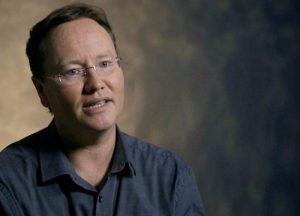 A lunch conversation for faculty with Dr. Mark Goodacre from Duke University. Dr. Goodacre is an eminent New Testament scholar who has also been a pioneer in the use of the internet as a tool to further academic and popular understanding of biblical scholarship. He created the well-known New Testament Gateway in 1998 and has been a lively inhabitant of the blogosphere since 2003, frequently connecting religious scholarship and contemporary culture. In this informal conversation, Dr. Goodacre will reflect on his past and present experiences, with some clues about what we may expect to see from the internet in the future.
A lunch conversation for faculty with Dr. Mark Goodacre from Duke University. Dr. Goodacre is an eminent New Testament scholar who has also been a pioneer in the use of the internet as a tool to further academic and popular understanding of biblical scholarship. He created the well-known New Testament Gateway in 1998 and has been a lively inhabitant of the blogosphere since 2003, frequently connecting religious scholarship and contemporary culture. In this informal conversation, Dr. Goodacre will reflect on his past and present experiences, with some clues about what we may expect to see from the internet in the future.
November 9, 2017
Adams Center for Teaching & Learning,
Abilene Christian University
St Catharine's Library Tour
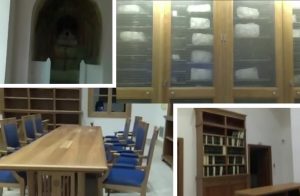 CSART scholars and fellows have the opportunity to participate in a real-time internet tour of the newly refurbished Library of St. Catharine’s Monastery at Mt. Sinai in Egypt. Father Justin of Sinai will conduct the tour, showing participants around the new facilities. He will explain the significance of the Library and answer questions about its history, current projects, and ongoing use.
CSART scholars and fellows have the opportunity to participate in a real-time internet tour of the newly refurbished Library of St. Catharine’s Monastery at Mt. Sinai in Egypt. Father Justin of Sinai will conduct the tour, showing participants around the new facilities. He will explain the significance of the Library and answer questions about its history, current projects, and ongoing use.
September 28, 2017
Ancient-Future Bible
 The Word of God is living and active, and it has been so for millennia. The rich heritage we have from our predecessors in the faith, from manuscripts to art and from reflection to action, can be a profound source of spiritual strength today. On Monday 18 September CSART will host a series of presentations by biblical scholars under the heading, “Ancient-Future Bible,” designed to empower Christians to engage God and his Word in new ways by going back to the future. The series of lectures will occur as part of ACU’s annual Summit conference and will meet in room 129 of the Biblical Studies Building on ACU’s campus. The lectures are free and open to the public.
The Word of God is living and active, and it has been so for millennia. The rich heritage we have from our predecessors in the faith, from manuscripts to art and from reflection to action, can be a profound source of spiritual strength today. On Monday 18 September CSART will host a series of presentations by biblical scholars under the heading, “Ancient-Future Bible,” designed to empower Christians to engage God and his Word in new ways by going back to the future. The series of lectures will occur as part of ACU’s annual Summit conference and will meet in room 129 of the Biblical Studies Building on ACU’s campus. The lectures are free and open to the public.
9:00 a.m. Wendell Willis — Jonah: Interpreted, Reinterpreted, and Interred
When you think of death and the afterlife, what stories and images come to mind? Is your first thought about Jonah? This visual presentation explores the second most popular image found in early Christian art. Come see how the earliest believers communicated their most fundamental hopes with art in the Roman catacombs and elsewhere.
10:00 a.m. Jeff Childers — Recovering the Words of Jesus: Deciphering an Ancient Aramaic Manuscript of the Bible
Discovered in 1895 and offered for auction in 2009, the manuscript Codex Climaci Rescriptus has many layers of text, including parts of the Bible in a rare dialect of Palestinian Aramaic very near to Jesus’ own dialect. Students and scholars at ACU and around the world are applying their skill with ancient languages and digital humanities, along with the technology of multispectral imaging to decipher the mysteries of this ancient Christian book.
1:30 p.m. Glenn Pemberton — Goliath Was Only Six Feet Tall? Who Has Been Messing with My Bible?: How the Oldest Hebrew Manuscripts are Shaping the Newest English Versions
“Some manuscripts read, ‘Come to this Lecture.’” Although this note cannot be found in your Old Testament, similar notes like it can. Indeed, they now clutter the bottom of many pages of the Bible. At this session, find out why your Bibles have changed so much over the last fifty years and how they will change in the next fifty.
2:30 p.m. David Kneip — Ancient-Future Reading: Encountering Scripture with the Church Fathers
When you read the Bible, does it sometimes feel like your eyes are just moving over the page or screen, but you aren’t really engaging the Scriptures at any depth? This session will offer you some ancient tools to renew and deepen your time in the Word, courtesy of our mothers and fathers in the faith.
3:30 p.m. Curt Niccum — Chromosomally Challenged Bibles: The War over Women in the Word
Feminism! Gender neutral! The last ten years has seen radical rewording of our Bibles and reactionary responses to it, even resulting in one version being pulled from bookstore shelves. What is going on and why is it such a big deal?
Artifacts & Ethics Luncheon
September 14, 2017
Goliath was only Six Feet Tall? Who Has Been Messing with my Bible?
We are glad to report that this lecture has been rescheduled to occur at CSART’s Ancient-Future Bible series during ACU’s Summit.
How the Oldest Hebrew Manuscripts are Shaping the Newest English Versions
You are invited to join us for a public Lecture by Dr. Glenn Pemberton, Professor emeritus of Old Testament in the College of Biblical Studies at ACU.
This lecture will explore the strange and marvelous world of deciphering the ancient manuscripts and sources lying behind the text of the Hebrew Bible. Not for Hebrew readers only! This presentation helps explain where the text of our English Bibles comes from, and what may be coming soon to an English Bible near you.
We hope you will join us for this delightful and informative evening.
April 4, 2017
7:00 p.m.
Chapel on the Hill, College of Biblical Studies, Abilene Christian University

For a larger campus map, click here.
Eucharist & Ecclesiology: a Book Release Event
Join us for a special book release event!
In 2013, eminent scholars from different religious traditions gathered on ACU’s campus to discuss Eucharist & ecclesiology. The gathering was convened in honor of world-renowned specialist in Early Christianity and retired ACU professor, Dr. Everett Ferguson, who has written often on these subjects.
Under the editorial supervision of CSART fellow Dr. Wendell Willis, the proceedings from that conference have now been published in a robust collection of essays: Eucharist and Ecclesiology: Essays in Honor of Dr. Everett Ferguson (Wipf & Stock, 2017). The collection has already been gaining critical praise:
“The Eucharist is at the same time the beating heart of the Church’s worship and a flashpoint of sacramental separation. This excellent collection of scholarly and readable essays explores eucharistic theology in biblical, historical, and ecumenical perspectives, and relates it to the doctrine of the Church. A useful resource and a fine achievement.”
Paul Avis, University of Exeter, UK; editor of The Oxford Handbook of Ecclesiology
CSART is proud to celebrate the publication of this book in a special event, featuring responses by Dr. Ferguson and Dr. Willis, and an opportunity to purchase the book and have it signed by the editor and honoree.
We hope you will join us!
March 7, 2017
7:00 p.m. Room 130, College of Biblical Studies, Abilene Christian University
Reception following
Jonah: Interpreted, Reinterpreted, and Interred
How a small biblical story became prominent in early Christian art
You are invited to join us for a public Lecture by Dr. Wendell Willis, Professor of New Testament in the College of Biblical Studies at ACU
This lecture will explore how a small biblical story became prominent in the early Christian art of the ancient Catacombs and elsewhere.
We hope you will join us for this insightful and enlightening evening.
February 7, 2017
7:00 p.m. Chapel on the Hill
College of Biblical Studies, Abilene Christian University
CSART Opening
You are invited to join us for the inauguration of ACU’s Center for the Study of Ancient Religious Texts and the 30th annual Carmichael-Walling Lectures at Abilene Christian University. Father Justin of Sinai will give the Carmichael-Walling Lectures as part of an inaugural celebration featuring special events, distinguished speakers, and an opportunity to see rare book and manuscript treasures.
November 3, 2016 (More Details)
Who's Afraid of Ancient Texts?
Dr. Mark Hamilton gives the inaugural CSART lecture at ACU, “Who’s Afraid of Ancient Texts? Rediscovering Old Worlds for a New Era.”
November 3, 2016 (More Details)
